


















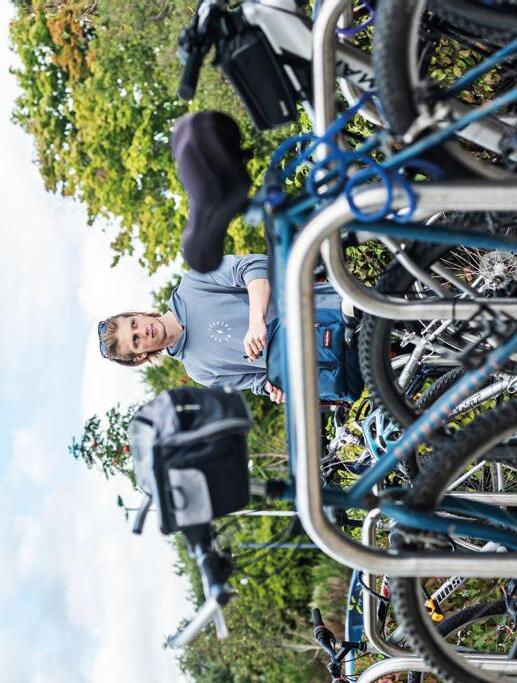

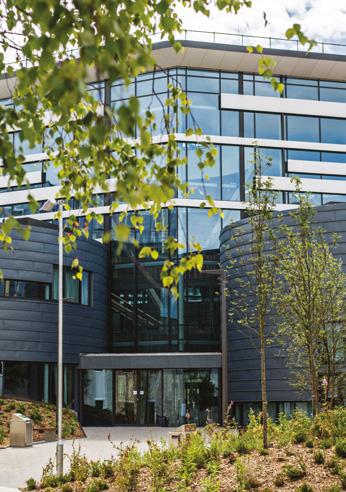
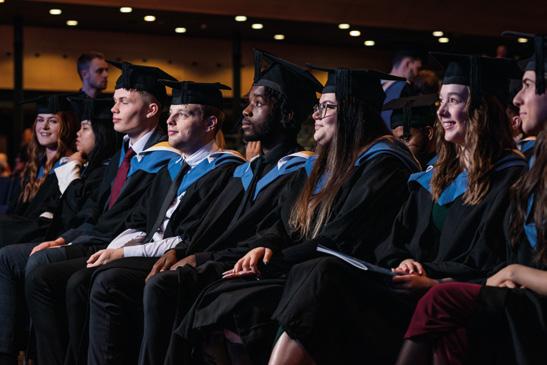
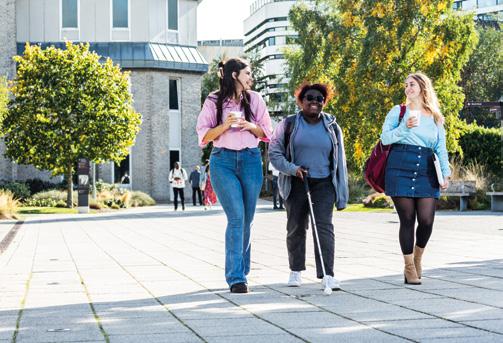
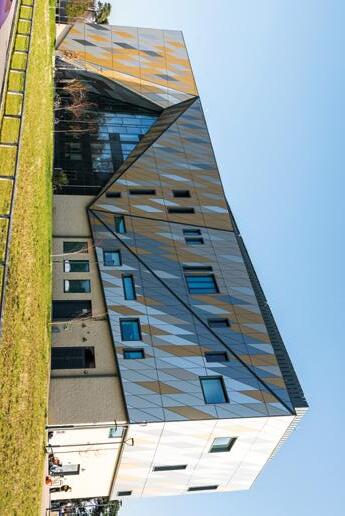
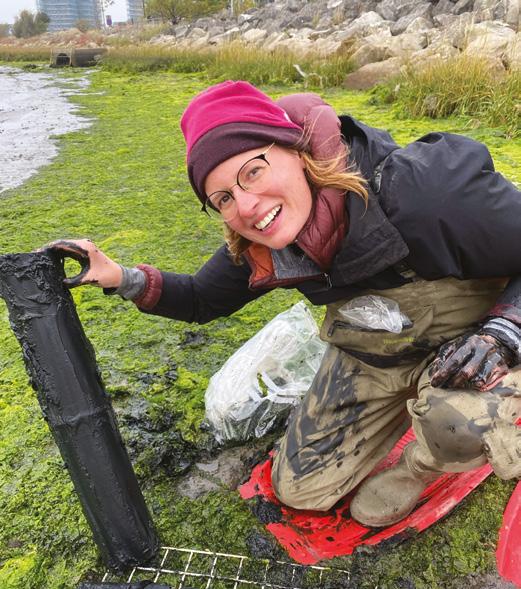
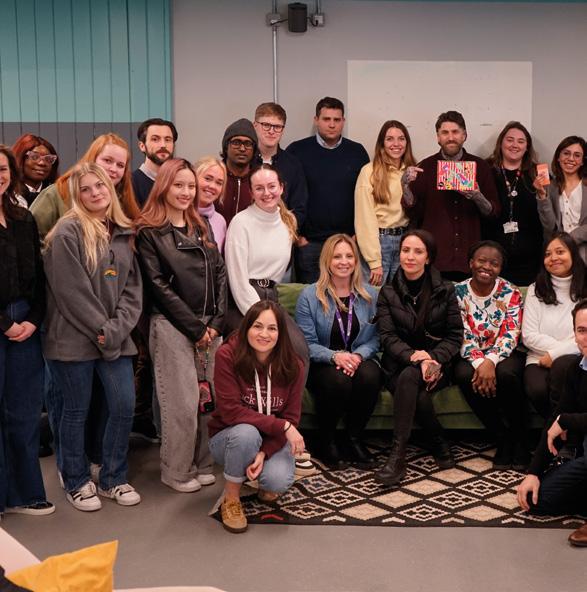
The 17 United Nations Sustainable Development Goals (UN SDGs) are a blueprint for creating a more sustainable future, addressing the greatest challenges facing humanity and our environment.
Sustainability lies at the heart of Bournemouth University (BU), and we recognise the profound responsibility, opportunity, and capabilities we have for actioning the UN SDGs through our research, education, practice and collaboration with the wider community.
We are proud to have ranked joint 39th in the world, out of 1,963 universities in the Times Higher Education Impact Rankings 2024. This achievement is a recognition of our commitment and efforts to drive action for the UN SDGs across our institution, though we know there is so much more to be done.
This is our third annual report which aims to summarise some of the work and actions we have undertaken prior to April 2024 towards the UN SDGs. Any data given in this report is for the academic year 1 August 2022 to 31 July 2023. Organised into four sections: education, research, public engagement, and operations, we hope that it can be used to celebrate the hard work of our community and inspire further commitment, collaboration, and action so that together we can even faster realise the blueprint of the UN SDGs.
At BU, we understand that sustainability is all about collaboration, which is why we are trying to bring together our research, education and professional practice. By pulling together people, ideas, knowledge, and resources from across the entire BU community, we are establishing ourselves as an innovative university with a different approach to solving the challenges of the modern world.
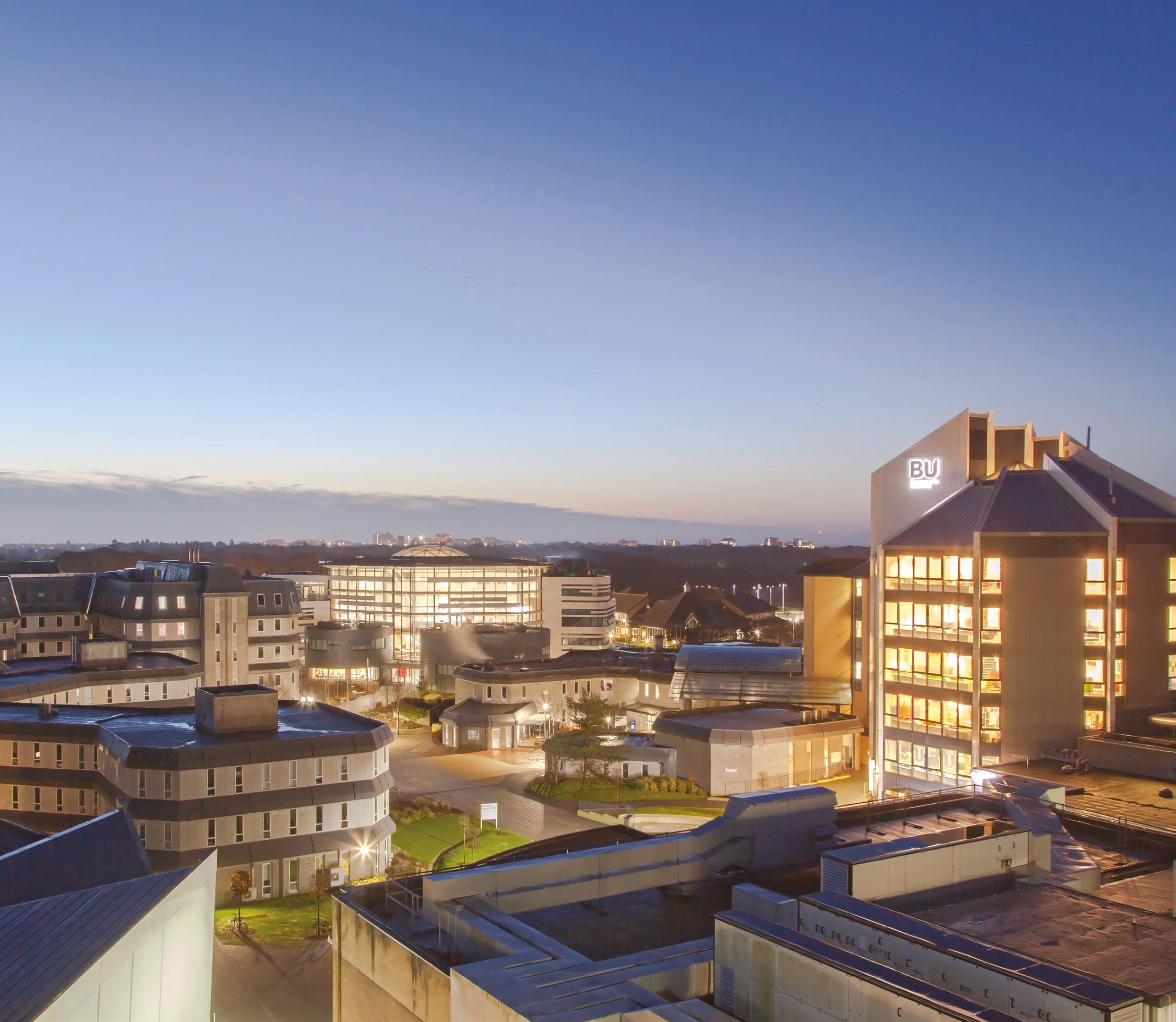
It is understandable then, that the UN Sustainable Development Goals (UN SDGs) align with the values and beliefs that BU has held for many years. Our work is helping people to live better for longer. We help to protect and preserve a sustainable environment. We help people and organisations to prepare for, and recover from a crisis. We challenge marginalisation, misinformation and under-representation. We are helping creative and cultural industries to thrive. Importantly, we are acting as a catalyst for growth and using our skills and expertise to advance the region.
These beliefs match well with making progress towards the UN SDGs, and they help us to provide a framework that shows how we are playing a part.
This report is a demonstration of how we have aligned our work to the UN SDGs across the university, so you can see that we are serious about delivering on our values, and using our unique position in society for driving positive change.
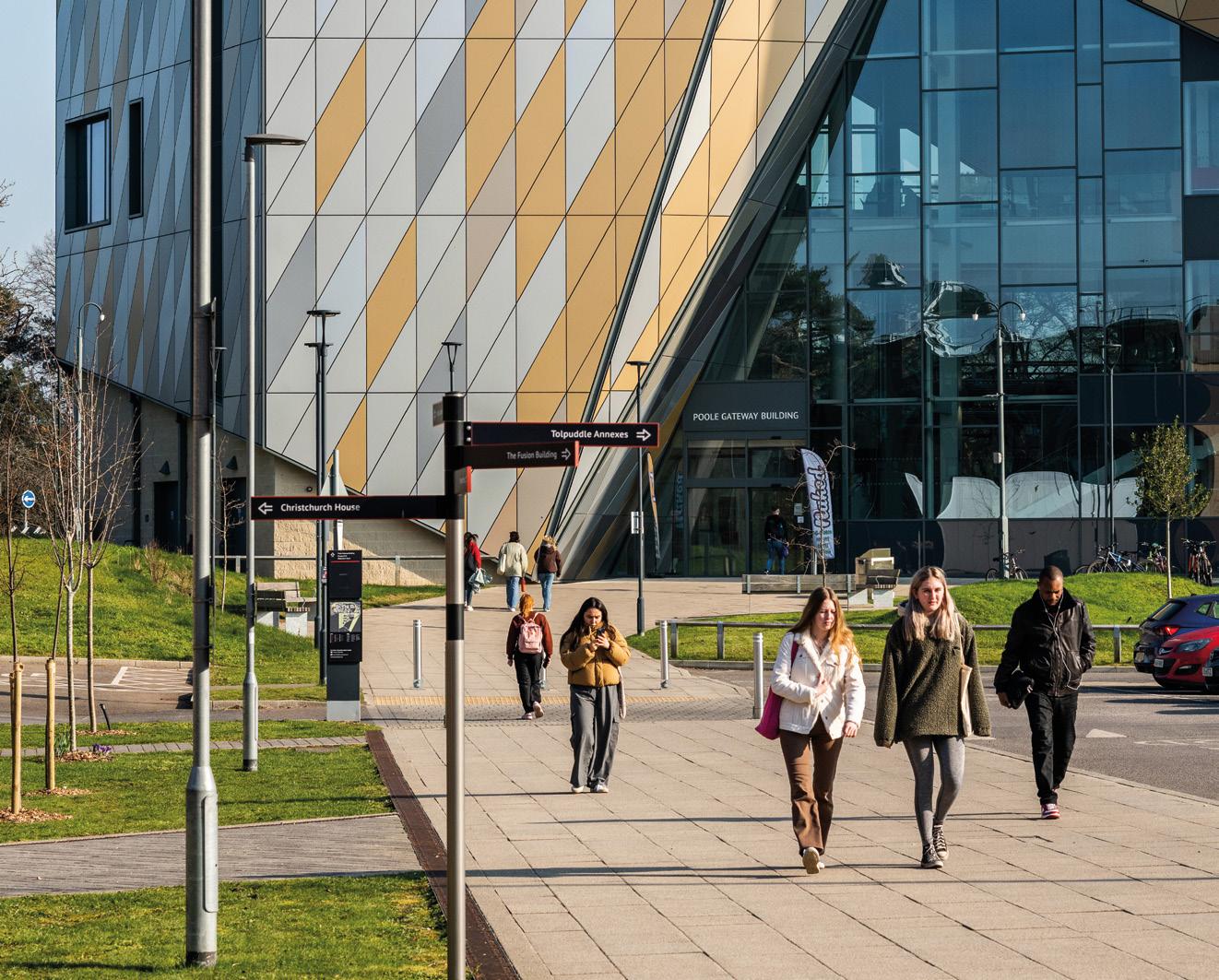

Bournemouth University helps people live better, for longer
Bournemouth University helps to prepare for and recover from crisis
Bournemouth University challenges marginalisation, misinformation and under-representation

This MSc Disaster Management course provides students with an understanding of how to develop disaster management plans and frameworks, manage both natural and man-made disasters and support humanitarian operations. Moreover, it provides awareness of and knowledge of the public health and economic implications, including increased poverty, of disasters and how to mitigate these.
Led by BU’s Disaster Management Centre (BUDMC), it helps communities to build resilience, especially of those in vulnerable situations, and reduce their exposure and vulnerability to climate-related extreme events and other economic, social and environmental shocks and disasters.
This course is accredited by the Association to Advance Collegiate Schools of Business (AACSB). AACSB business accreditation demonstrates an ongoing
commitment to excellence in teaching, research, curriculum development, and learner success.
The BA (Hons) Social Work course provides students with both an academic qualification, and a professional qualification. Students have the opportunity to explore the nature and impact of possible causes of social exclusion and discrimination, relevant law and social policy, and the meaning of social justice in relation to the role of social workers working in complex and diverse contexts.
Crucially, people with lived experience are actively and meaningfully involved in all aspects of the course through the Public Involvement in Education and Research (PIER) partnership. Therefore, this degree offers a powerful blend of academic study with essential practical experience.
69th in the world 12th in the UK
73.1 Research score out of 100
54% programmes aligned to this UN Sustainable Development Goal
Effects of trade on food prices
Professor of Economics
Tim Lloyd was commissioned by the UK Government to take on a confidential project to assess the impact of Brexit on food prices in Britain.
Tim and his team developed a new interface tool, called STEFI, which was designed to allow analysts at the Department for Environment, Food & Rural Affairs (DEFRA) to simulate how food prices here in the UK might change following the loss of free trade with Europe, as well as the potential for free trade agreements with other countries. Changes in trading arrangements would have consequences for the price of food, some products would become more expensive and some cheaper.
This led to DEFRA wanting to understand what this would mean for UK shoppers, especially those on low incomes.
Adding to Social capital and individual Potential
In disadvantaged Regions (ASPIRE)
Taking place across Europe, and led by Professor Lee-Ann Fenge, Professor Jane Murphy and Dr Sophia Amenyah at BU, the ASPIRE project is an innovative project which will co-create a holistic model to reduce unemployment and obesity at the same time.
The project will help participants grow fresh produce, learn new skills, improve their self-confidence, diet and wellbeing. By practicing a healthy lifestyle and learning new skills, individuals will be able to improve self-confidence and wellbeing as well as reduce their weight, increase activity levels and obtain employment, volunteer or get into training. The overall goal of the ASPIRE project is to give participants the support, skills and confidence needed to make healthier lifestyle choices for themselves and their families.
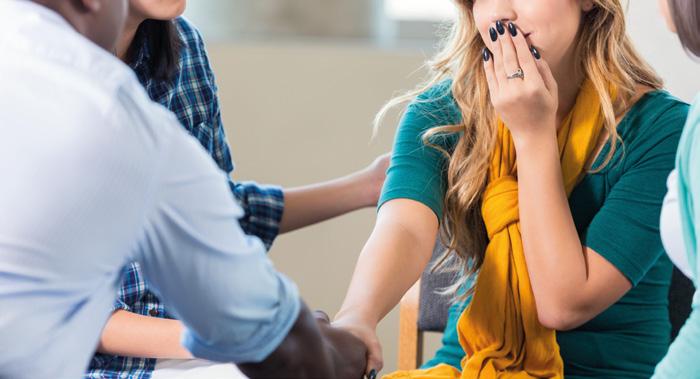
The Poverty Truth Commission is a project rooted in lived experience which seeks to tackle the root causes of poverty in the Bournemouth, Christchurch and Poole (BCP) area.
The Community Commissioners (CCs), all of whom have experienced poverty locally meet regularly with Civic/Business Commissioners (CBCs) to discuss issues such as housing, mental health, rising costs, and benefits. Professor Mel Hughes, Principal Academic in Social Work, is one of the CBCs.
This model brings together people in positions of power and influence (CBCs) and people with lived experience of poverty (CCs) in commissions across the UK, to connect and understand each other’s worlds.
National Centre for Post-Qualifying Social Work and Professional Practice (NCPQSWPP)
The NCPQSWPP at BU has delivered trusted education, research and consultancy with NHS Trusts, local authorities and other major employers in England, including the British Forces Social Work Service over the past 19 years. The centre is now working with over half of the local authorities in England.
Professor Lee-Ann Fenge, Research Lead of the Centre for Post-Qualifying Social Work, said “There is no other university in the UK that has had comparable impact on the social work profession, and this is why the former General Social Care Council (GSCC) recommended our designation as the National Centre in 2010”.
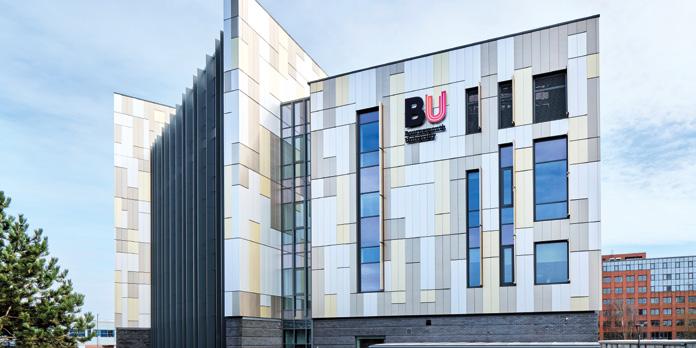
We offer various types of financial support funding to our students, in addition to a range of bursaries, undergraduate scholarships and postgraduate scholarships to students. These include:
Maintenance Bursaries
2,395students supported in 2022-23
BU Laptop Support Fund
83students supported in 2022-23
BU Financial Support Fund
611students supported in 2022-23
For 2022-23, an additional £267,000 was provided by Health Education England to support healthcare students – 1,099 students were supported.
BU Care Leavers Bursary
42students supported in 2022-23
Placement Opportunity Fund
89students supported in 2022-23
International Emergency Fund
17students supported in 2022-23
We continue to provide financial awareness and education to students with the help of external partners.
£3,018,004 provided to students as financial support
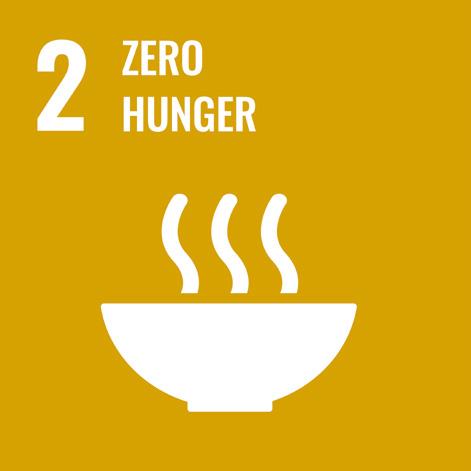
Bournemouth University helps people live better, for longer
Bournemouth University helps to protect and preserve a sustainable environment
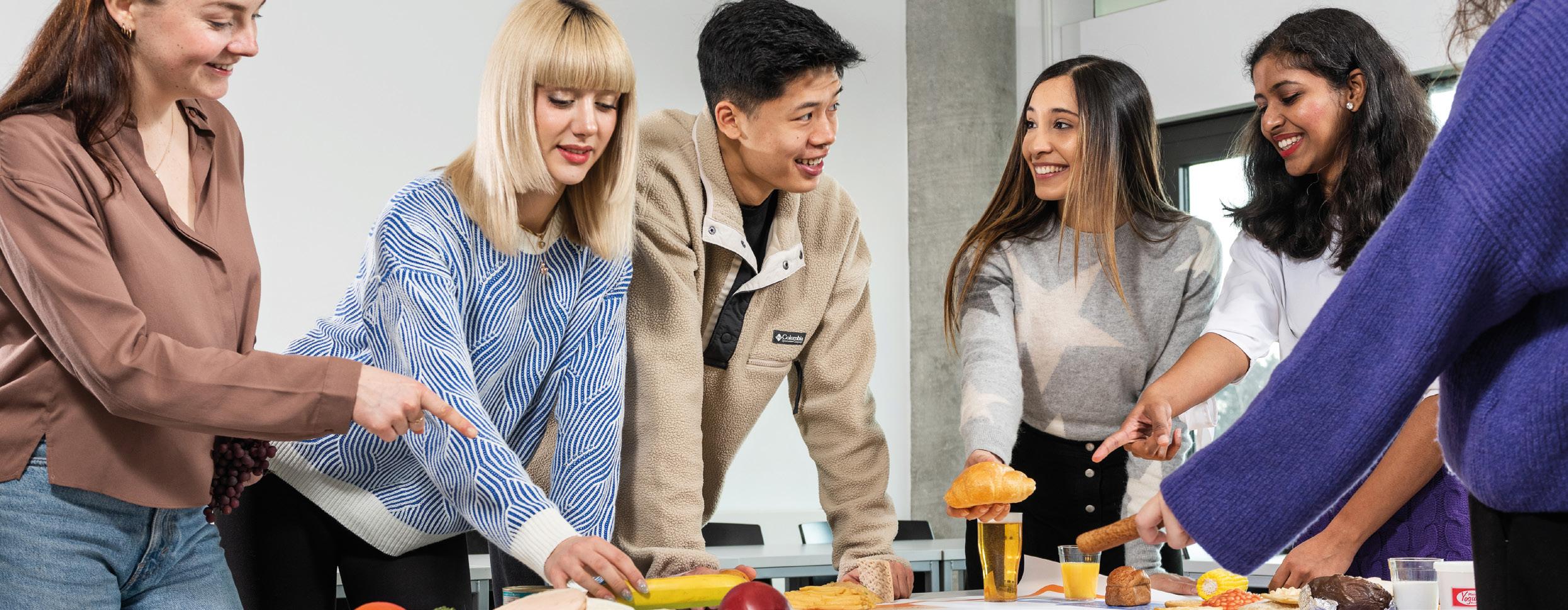
Bringing depth and real-life insight into its teaching, the staff on BSc (Hons) Nutrition bring their involvement in leading research contributing to societal change into the programme content, including projects to improve nutritional health and reduce malnutrition in older people and work to transform nutritional care for people with dementia in care homes.
The course is accredited by the Association for Nutrition (AfN) and prepares students for a range of careers such as working within local or national government, advising on nutrition policy, helping a charity or consumer group concerned with nutrition, or assisting with emergency relief and voluntary organisations.
Also accredited by AfN, the MSc Nutrition & Behaviour course is the first of its kind in the UK to explore the bi-directional impact of nutrition on behaviour and the brain, and the impact of behaviour on diet.
This course enables students to discover the role of nutrition in topics such as food promotion, prevention of diet-related disease, and the role of diet in normal ageing and age-related conditions.
Students also have the opportunity to put learning into a professional context within the healthcare, community, or private sector.
101-200 in the world
15th in the UK
71.2 Research score out of 100
39% programmes aligned to Sustainable Development Goals
In collaboration with Sri Ramachandra, one of our partner universities, Dr Reena Vijayakumaran has been researching the food insecurity situation in India to inform appropriate policy actions to address it effectively.

This involved studying the food insecurity and related health behaviours in one rural village in South India (Tamil Nadu
state) using observation and semistructured interviews. This research also facilitated collaborative learning, as both BU students (through the student mobility programme – Turing) and local Indian students conducted this research together among six households. Observations revealed that food consumption was affected by economic status and there was evidence of nutrient deficiencies, however there were also already existing traditional practices in place that focus on sustainable food systems and food alternatives.
The research concluded that the foundation for a sustainable food system exists, however there is a need to focus on nutrition education for the local community.
Professor Katherine Appleton, Professor In Psychology, has been investigating the reasoning underlying different dietary choices. This study aimed to explore public understanding of sustainable diets and any willingness or attempts to make changes towards sustainability.
The research concluded that action should focus on increasing awareness and knowledge of the environmental impacts of dietary choices, focusing on small easy changes of likely impact and personal benefit, and increasing availability and accessibility to sustainable diets.
Our catering partner at BU; Chartwells, have achieved a three-star rating in the Sustainable Restaurant Association (SRA) Food Made Good Sustainability standard, which is the highest possible rating.
The SRA works to accelerate change towards a global hospitality sector that is socially progressive and environmentally restorative.
Built on a ten-point framework that allows for a complete 360-degree assessment of operations, Food Made Good takes a holistic approach to sustainability, evaluating impact across pillars of Sourcing, Society and Environment.
This is part of the delivery of our Sustainable and Ethical Food Policy which commits the university to ‘manage catering to minimise harmful effects and enhance the positive benefits of providing food and drink choices for customers and stakeholders’.
21.38 tonnes of food waste was sent for anaerobic digestion in 2023.
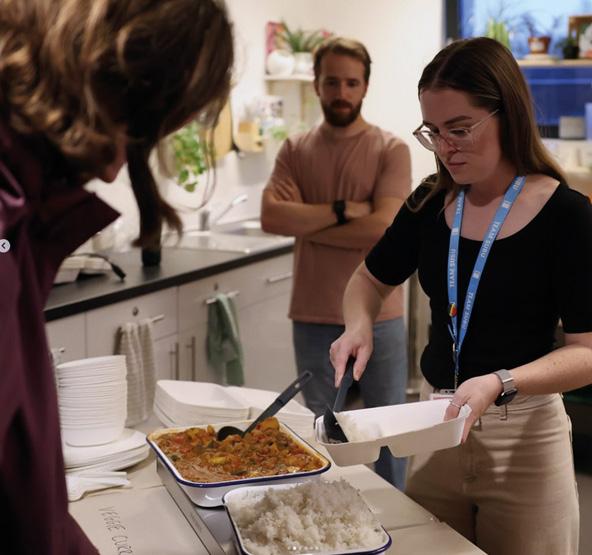
The Community Kitchen at BU is run by the Students Union Advice Service team. It was a reaction to the cost-of-living crisis with the goal of helping students who were hit by rising living costs, as well as combatting food waste and raising awareness of sustainability goals.
The Community Kitchen is located within the Student Union premises and has basic food preparation facilities, including a microwave, a boiling water tap, and a fridge where free food is available. There is also advice on budgeting and healthy eating being offered alongside the food at events.
SUBU Advice worker Sydnie O’Hara said, “In an ideal world, we wouldn’t need the Community Kitchen, but the support that it provides for people is really valuable. So, it is definitely worth it”.


Bournemouth University helps people live better, for longer
Bournemouth University helps to prepare for and recover from crisis
Bournemouth University challenges marginalisation, misinformation and under-representation
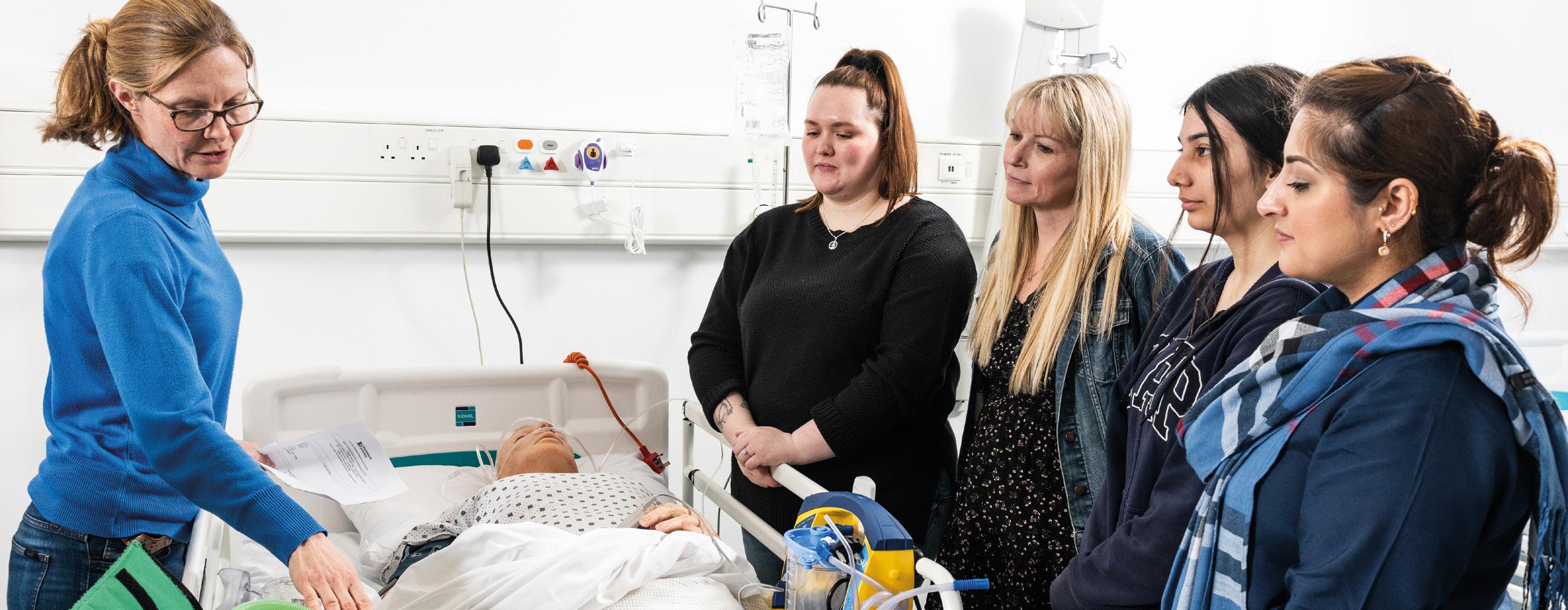
We have a dedicated Faculty of Health & Social Sciences, in which relevant courses benefit from professional accreditations or approval from bodies such as the Nursing & Midwifery Council (NMC), the College of Paramedics, the Association for Nutrition, the Chartered Society of Physiotherapy, the Royal College of Occupational Therapists (RCOT), the Health & Care Professions Council (HCPC) and Social Work England.
With over 20 programmes within the faculty, thousands of students have graduated ready with the knowledge, skills and training to enter the NHS and broader health sector, having benefitted from courses with clinical and community simulation suites and integrated placements in a research-led environment.
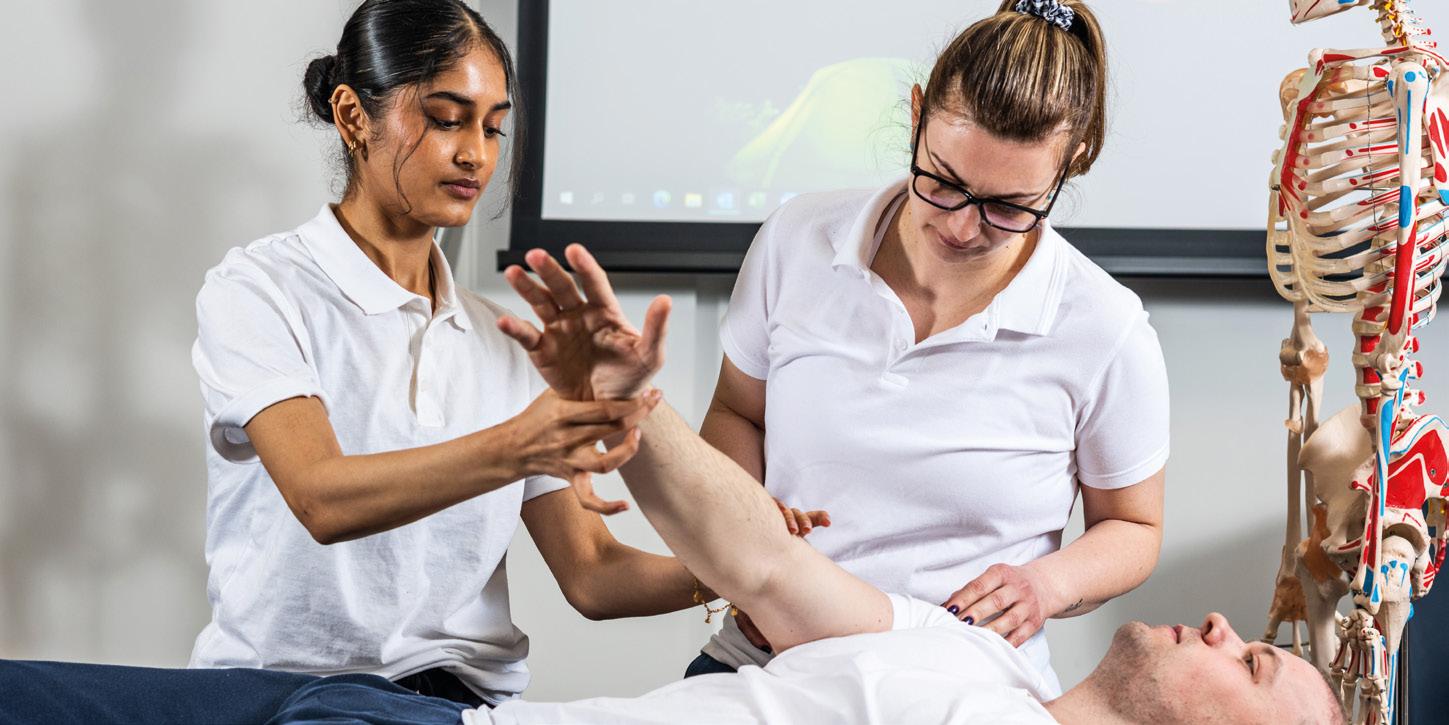
BU academics have collaborated with other universities to examine the potential of academic and industry partnerships for advancing healthcare. This research highlights the main source of innovation in the healthcare sector to be knowledge exchange between academic institutions and other economic actors, such as industry, the media, governmental agencies, and the general public. These partnerships can hasten medical innovation, strengthen patientcentred research, and close the gap between theoretical understanding and real-world implementations.

The principal investigator of this project, PhD student Leila Kattach, and the project team are aiming to develop a new nurse-led model to improve how skin cancer care is provided within the NHS.
This model will be transferable to different NHS Trusts and benefit both patients with skin cancer and individuals who require assessment of one or more skin lesions. The uniqueness of this model lies in its co-creation process, involving input from a patient and public involvement advisory group, service users of national skin cancer services, and expert dermatology doctors and nurses.
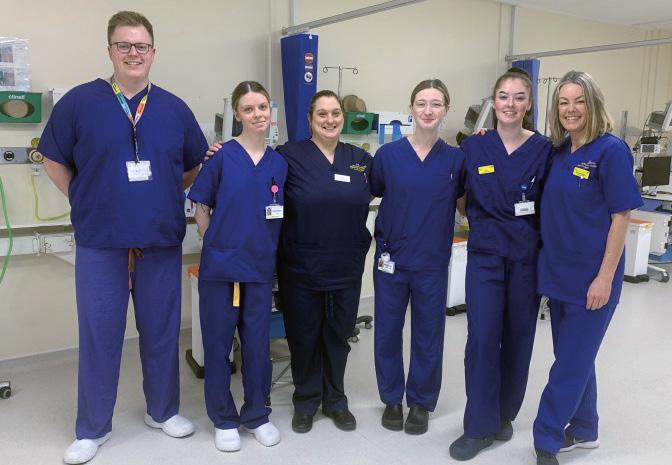
Our long-standing partnership with the University Hospitals Dorset NHS Foundation Trust – recognised by the Trusts’ university status – benefits both organisations through research collaboration, placement support, and recruitment and training opportunities. BU students from across healthcare disciplines undertake placements at hospitals in our region, giving them the chance to put their learning into practice with support and guidance from a mentor or practice supervisor.
In January 2024, UHD and BU collaborated to host a series of free Understanding Health talks, with the first focusing on menopause.
We have achieved the UNICEF UK Baby Friendly Award for our midwifery programme, which recognises the high quality of education provided at BU is sustainable in ensuring that midwifery students can offer excellent infant feeding support, recognised and valued by our Trust partners.
The progression of Baby Friendly at BU included recruiting Baby Friendly student reps, and working with Portsmouth Hospitals University Trust to set up student-led feeding clinics. Midwifery students at BU are taught how to use dolls and knitted breasts of all colours, shapes and sizes to demonstrate to women how to breastfeed - a useful tool for making women feel comfortable in the clinic.
Nicola Keefe, BU graduate and Infant Feeding Lead Midwife at Portsmouth Hospitals said, “Through studying at a BFI Gold accredited university, BU graduates are confident and competent to support women with infant feeding and provide safe, consistent, and passionate care.”
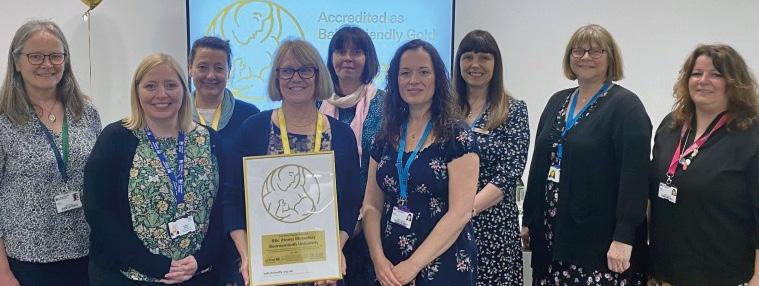
Since January 2017, BU has delivered MHFA England’s Mental Health First Aid training and development programme. To date, over 200 staff and students have been trained in either a two-day MHFA ‘First Aider’ course or a one-day MHFA ‘HE Champion’ course.
Both courses are fully developed, monitored and endorsed by MHFA England, who regularly audit for quality, appropriateness and accuracy of the instructor.
Sexual and reproductive healthcare services are available to all students free via the NHS. We also support teams on campus from the Student Medical Centre and Student Wellbeing to SUBU Advice. The Dorset Sexual Trauma and Recovery Service (STARS) run weekly drop-in sessions.
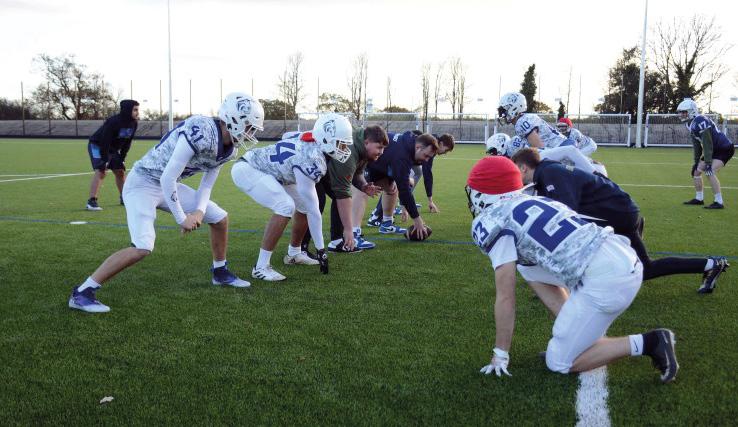
Our sports campus, Chapel Gate, has 65 acres of space, and regularly hosts local sports clubs and schools. This space also includes a nature connection area, which offers a space for users to build resilience, teamwork and a further understanding of the natural world.
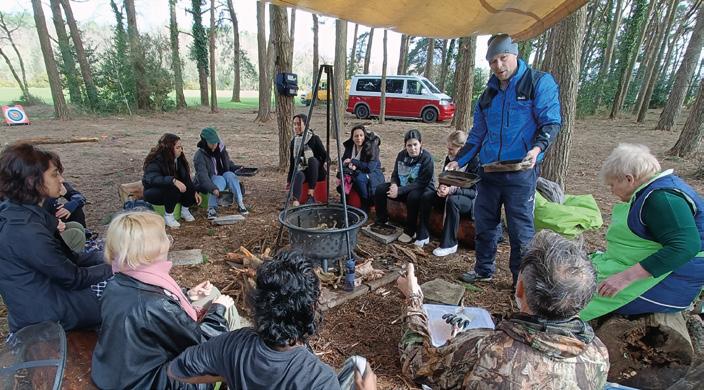
During term time, we encourage both staff and students to use Chapel Gate to support their health and well-being. In 2022-23, for performance sport, 336 matches were played, equivalent to 615 hours of site usage. For campus sport, 195 matches were played, equivalent to 387 hours of site usage.
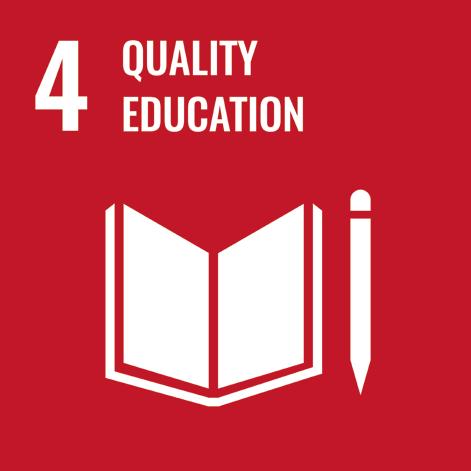
Ensure inclusive and equitable quality education and promote lifelong learning opportunities for all
Bournemouth University challenges marginalisation, misinformation and under-representation
Bournemouth University is helping creative and cultural heritage to thrive

As a university, our greatest legacy is our students, so we have a responsibility to ensure that our graduates leave BU with the skills, knowledge and values to support the achievement of the UN SDGs. Therefore, we have committed to aligning all our programmes by 2025 to the UN SDGs. This work is strategically led by our cross-faculty Sustainability Academic Network who report to the Sustainability Committee. This year, 96% of programmes aligned to at least one UN SDG.
One excellent example of progress in ESD at BU is the integration of the Biodiversity and Ecosystem Services unit into our MSc Public Health course.
Taught within BSc (Hons) Cyberpsychology, BSc (Hons) Psychology, BSc (Hons) Psychology with Counselling, and BSc (Hons) Psychology with Forensic
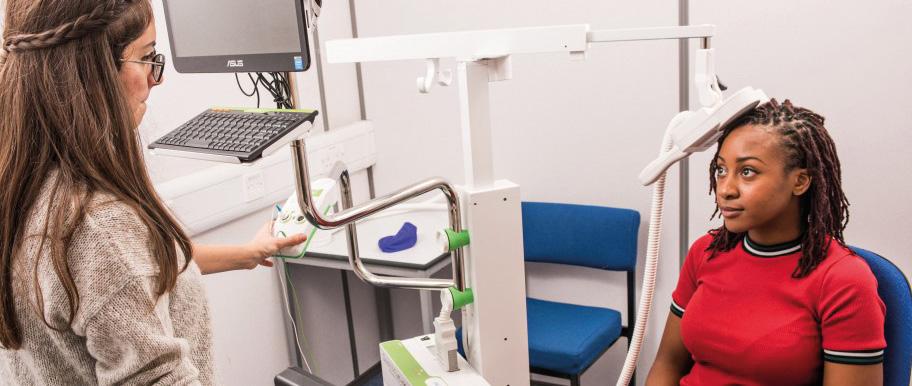
Investigation, this unit provides an introduction to educational psychology, special educational needs, labelling, and inclusive education. It empowers students with knowledge that reflects how education can reduce prejudice and promote equity in the schooling for all children.
It covers conditions that can affect learning and schooling experiences, gender stereotypes in learning and how gender biases can affect academic achievement, as well as reflecting on inclusive learning practices and how cultural norms affect the definition of this concept. Students discuss how teachers can motivate their students, and work collaboratively with parents to explore how schools can build strong partnerships with external professionals, families and the community to promote resilience in students.
THE Impact Rankings 2024 result
201 - 300 in the world 5th in the UK
68.3 Research score out of 100
83% programmes aligned to this UN Sustainable Development Goal
Professor Fiona Cownie and Michael Sunderland have been examining the place of sustainability within journalism education in the context of Higher Education (HE). They argue that meaningful journalism education must capture the SDGs as part of ESD.
This research pulls together the SDGs, ESD, the UNESCO learning outcomes, and two good practice case studies from undergraduate and postgraduate journalism education to produce a framework to show how journalism educators can embrace the sustainability agenda, and in doing so, enhance students’ learning experiences.
Purposeful and unintentional greenwashing in higher education
Professor Fiona Cownie has been investigating the implications of greenwashing within HE institutions. This research identified evidence of unintentional greenwashing, influenced by a lack of sustainability literacy and collaborative orientation, and argues that both purposeful and unintentional greenwashing are a potential threat to engagement with the sustainability agenda within HE institutions.
The research also sets out a plan for challenging greenwashing, and for developing a policy relating to greenwashing to inform marketing departments’ activity. This will help to support sustainable behaviours within HE institution communities, build green trust within the sector, and provide students with exemplars of good practice to inform their future professional endeavours.
Our Schools Liaison team co-ordinate talks, workshops and events to raise awareness among young people of higher education, with the aim of creating enthusiasm about the possibility of studying at university.
The team support both teachers and students, with a focus on young people living in low participation neighbourhoods, students from low socio-economic backgrounds, young people in care and students with special educational needs.
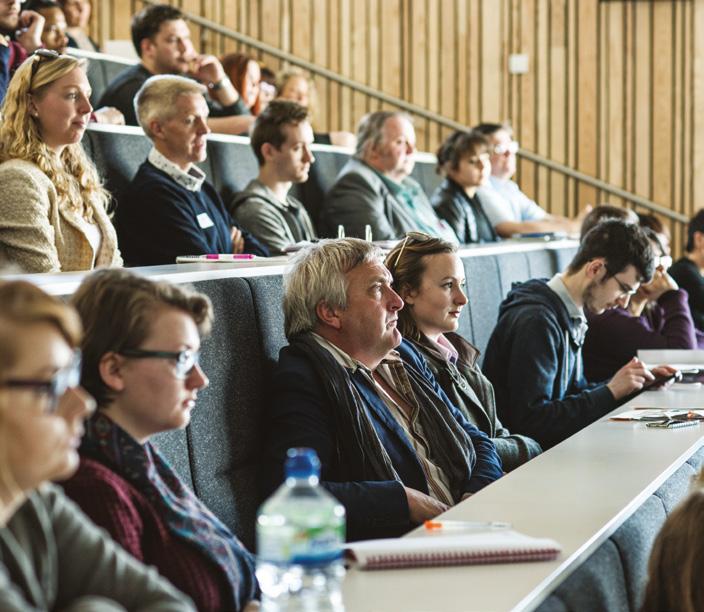
We want staff and students to help us develop and monitor our approach to carbon management, which is why we host climate assemblies twice per year as a chance for all members of the BU community to learn about a specific sustainability topic, and to voice their perspectives and recommendations.
This year, we held a climate assembly on ESD. Students emphasized the importance of consistent communication about the climate crisis across the entirety of their course, and the value of being able to attain something tangible for their efforts towards sustainability for enhancing employability.
The academics said they want more feedback from their students as to how they should be embedding the climate crisis into their teaching, more department-specific support and guidelines, and to develop cross-faculty projects where students receive credit for working on sustainability-related projects together.
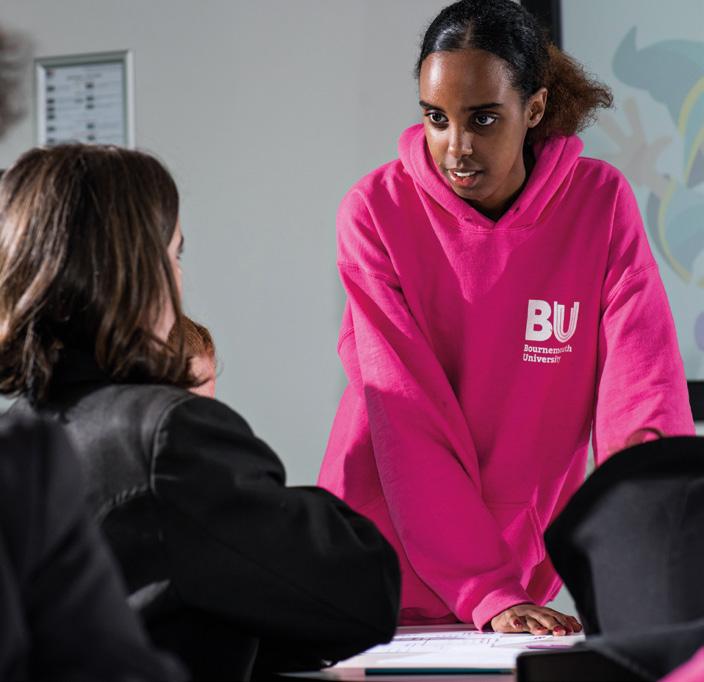
In higher education, students from ethnically diverse backgrounds often don’t succeed as well as white students. This is a sector-wide problem, and here at BU we want to make sure that everyone has the best chance to succeed.
To address inequality at BU, particularly the Black, Asian, and minority ethnic (BAME) student attainment gap, the Inclusive Curriculum Evaluation (ICE) project aims to improve the inclusivity of BU’s curriculum and how that is experienced by students of different ethnicities and backgrounds. To do this, the project team employs Student Reviewers to review our curriculum specifically for inclusivity.
You can learn more about the project through this podcast, and if you would like to involved with this project, go to the project webpage.
Dr Keith Parry, who led on the ICE project said, “I think the real power of our project has been the involvement and empowerment of students – they see things we miss and bring completely different perspectives”.
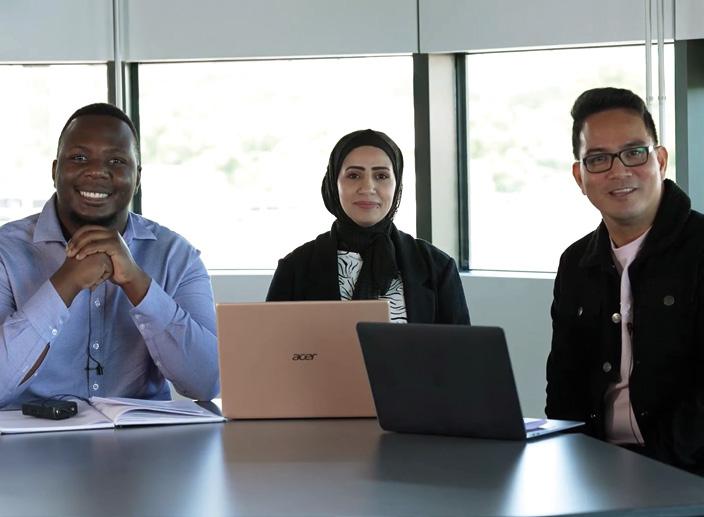

Bournemouth University challenges marginalisation, misinformation and under-representation
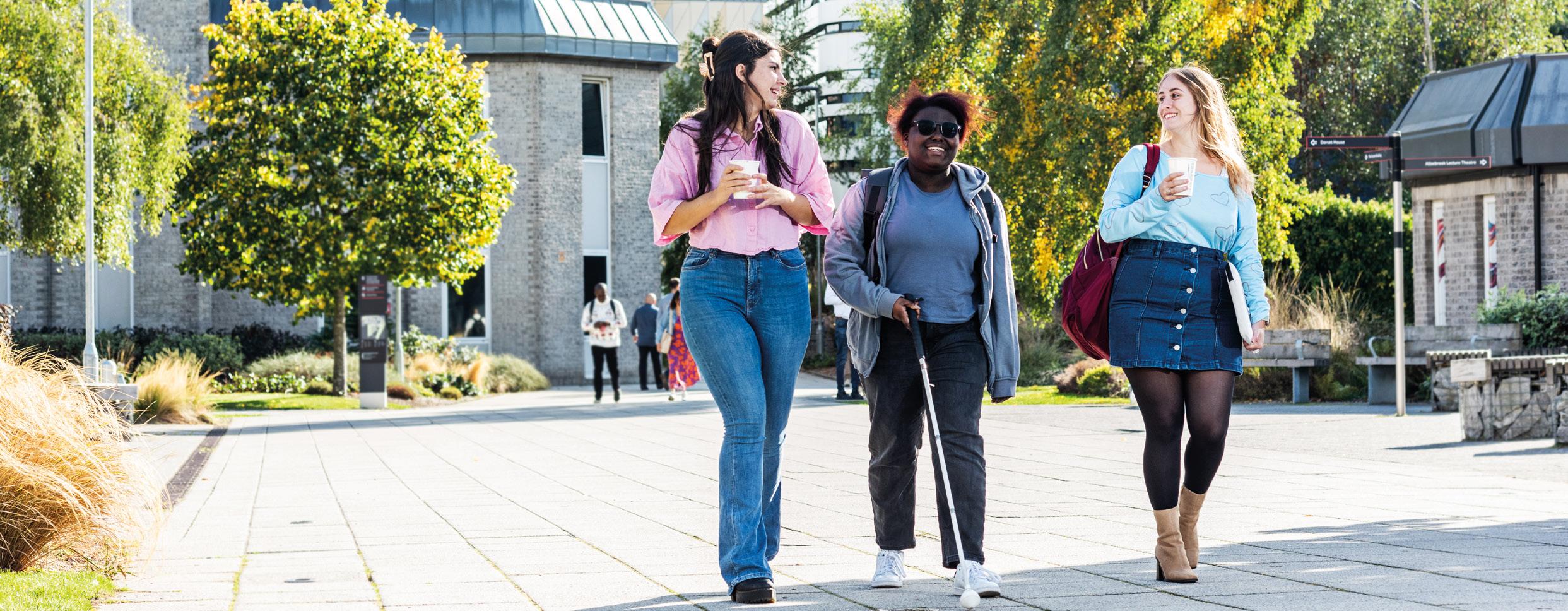
The BU Women’s Academic Network (WAN) aims to support women and to raise their profile within organisations and beyond, as well as lobby on gender inequality issues. Despite decades of lobbying and notable achievements gained by women in the workplace, women in academia have not managed to make significant gains across the sector.
The network hosts a programme of events that raise the profile of women across the sector and create a regular networking forum. It also works alongside professional departments at BU to offer mentoring support and high-profile role models to female academics to ensure academia is equal, diverse, and inclusive.
This final year unit on the BA (Hons) Sociology course explores gender as a socially constructed and historically variable aspect of societies, past and present.
Students are required to examine the ways in which gender informs and structures social inequalities, and analyse the interrelationships between gender, power and other social categories (e.g., class, sexuality, race, ethnicity, religion, age, and nationality). THE Impact Rankings 2024 result 101-200 in the world 10th in the UK 86% programmes aligned to this UN Sustainable Development Goal
65.8 Research score out of 100
It’s not just physical: gender and bias in equity crowdfunding
Globally, women entrepreneurs are disadvantaged when it comes to accessing traditional capital markets. This has a ripple effect on women- led ventures and their creation and survival. If women had the same opportunities as men to be entrepreneurs, it would boost global GDP by 3-6% and global economy between $2.5 trillion to $5 trillion.
Dr Sukanya Ayatakshi Endow, Principal Academic in Entrepreneurship, has conducted research into the unconscious gender bias on crowd funding platforms, and its impact on women’s entrepreneurship. The research revealed that the physical gender of a team and the gender of the primary signatory has an influence on the final decision, and is associated with a decreased success of the funding. Also, that any gendered nuances in the language within the campaign can have a significant impact. The findings have implications for policy makers to recognise and create equitable policies to support women entrepreneurs. This research is also available to listen to in this podcast
British Girls’ Comics Database
Supported by the Women’s Academic Network, Dr Julia Round, Associate Professor of English and Comics Studies, has created two databases of story summaries and creator credits for two landmark British girls’ comics: Spellbound and Misty.
In partnership with Soroptimist International Bournemouth and BCP Community Safety Partnership, Dr Louisa Oliver and Dr Orlanda Harvey (Senior Lecturers in Social Work) hosted a Violence Against Women and Girls Summit at BU.
The summit delegates included social services, policy makers, the police, researchers, and managers of charities. The summit conversations were focused on finding solutions to challenging the culture surrounding violence and abuse, with an emphasis on the need to start early and focus on education.
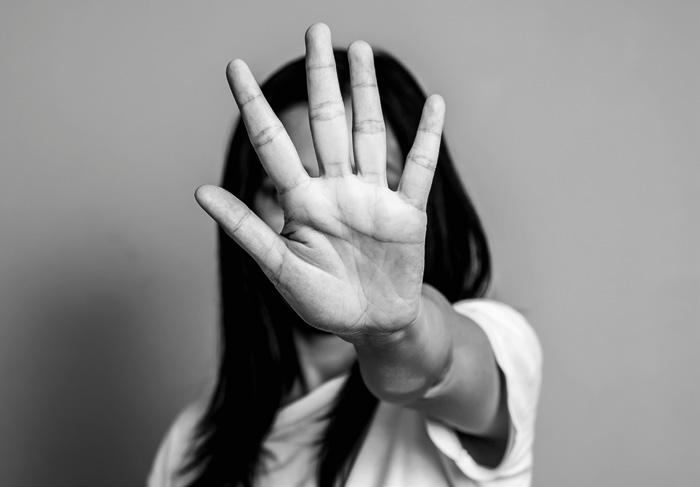
Dr Louise Oliver and Dr Orlanda Harvey said, “we are delighted so many professionals have shown willingness to engage in working together to seek ways to challenge the status quo and continue to seek solutions”.
BU are proud to hold an Athena SWAN bronze award. This award recognises work undertaken in Science, Technology, Engineering, Mathematics and Medicine (STEMM), and Arts, Humanities, Social Sciences, Business and Law (AHSSBL). The award also recognises work to address gender equality more broadly for all academic and professional and support staff as well as students.
BU’s successful submission for a bronze award follows our commitment to strive for a gender inclusive culture across the university. BU is now focused on the local implementation of the SWAN Charter principles in the faculties and services, supporting all academics departments to achieve SWAN awards by 2025. BU have created an Athena SWAN institutional self-assessment team, which oversees the gender equality work at BU and is a sub-group of the Equality and Diversity Committee, to operationalize this goal.


British comics dominated children’s entertainment in the United Kingdom for several decades, however, the majority of British comics in the 1970s did not credit their writers or artists, and the comics themselves are often hard to access. These databases are helping to remember and explore the ephemeral content that was highly prized by its young female readers, and to preserve the legacy of highly talented and innovative creators.
MDes Product Design student, Amy Baker, has developed ‘Portia’ - a portable menstrual cup cleaner designed to aid cleaning menstrual cups on the go, e.g. in public toilets, whilst only using warm water from the tap.
Amy’s research revealed that that 70% of current menstrual cup users said they wouldn’t feel comfortable cleaning their menstrual cup in a public toilet due to period taboos, embarrassment, and inconvenience. Portia provides a discreet solution where the user can empty, clean, and reinsert their menstrual cup without leaving the toilet cubicle.

Our Gender Pay Gap report measures differences between the average (mean and median) earnings of men and women who work at BU, and it is our aim to eliminate the gender pay gap by 2025. However, we know that there is an uneven distribution of men and women across the pay and grading structure. When the results of the 2022 and 2023 gender pay reports are compared the results have improved as follows:
• The mean base pay gap has reduced from 15.9% to 14.9%
• The median base pay gap has also reduced from 16.2% to 15.8%
Inclusivity is a core value that underpins the University’s BU2025 strategic plan and we will continue to work and report on the action we are taking to address gaps and challenges in equality and diversity in order to support development, progression and achievement for all.
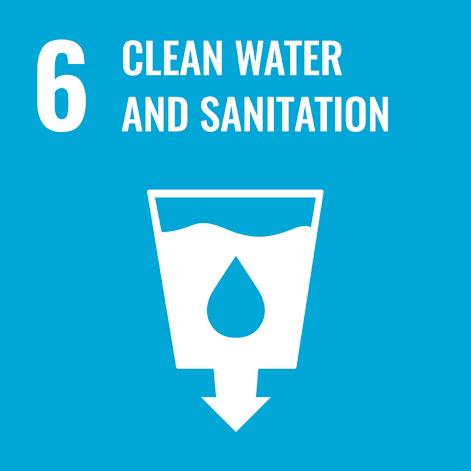
Bournemouth University helps people live better, for longer
Ensure availability and sustainable management of water and sanitation for all
Bournemouth University helps to protect and preserve a sustainable environment
Bournemouth University challenges marginalisation, misinformation and under-representation
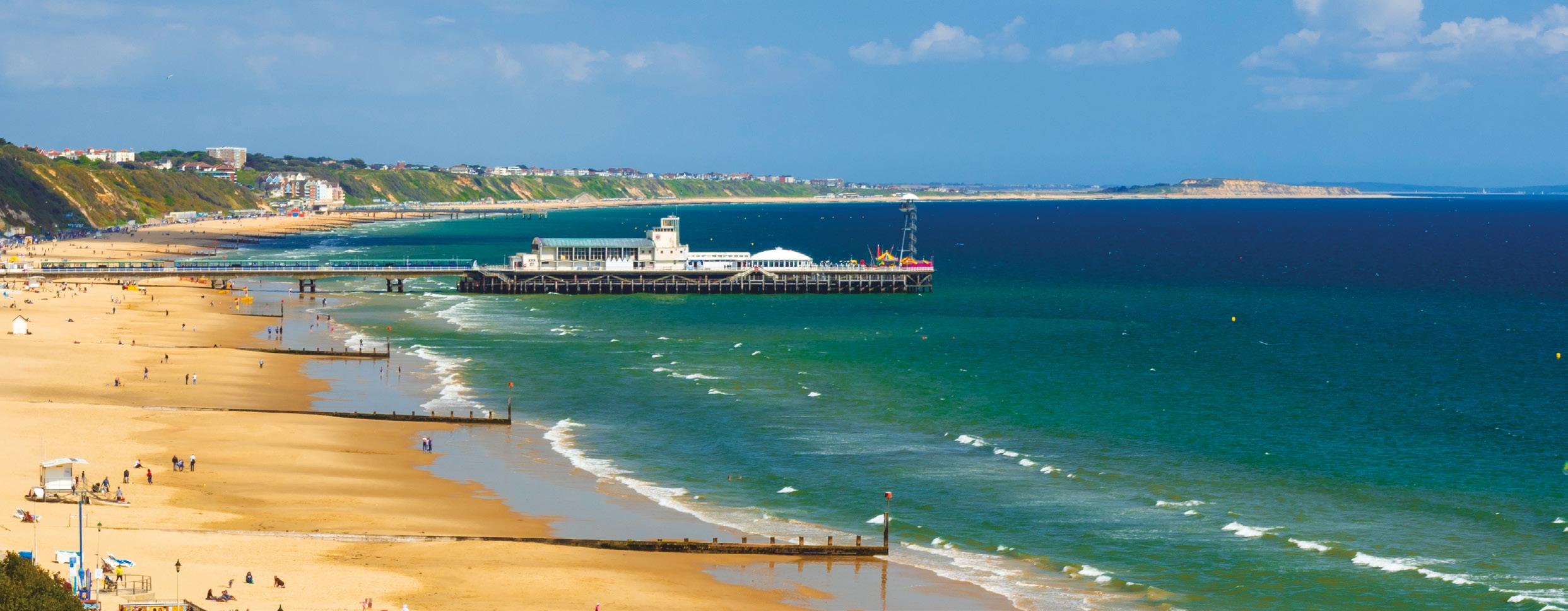
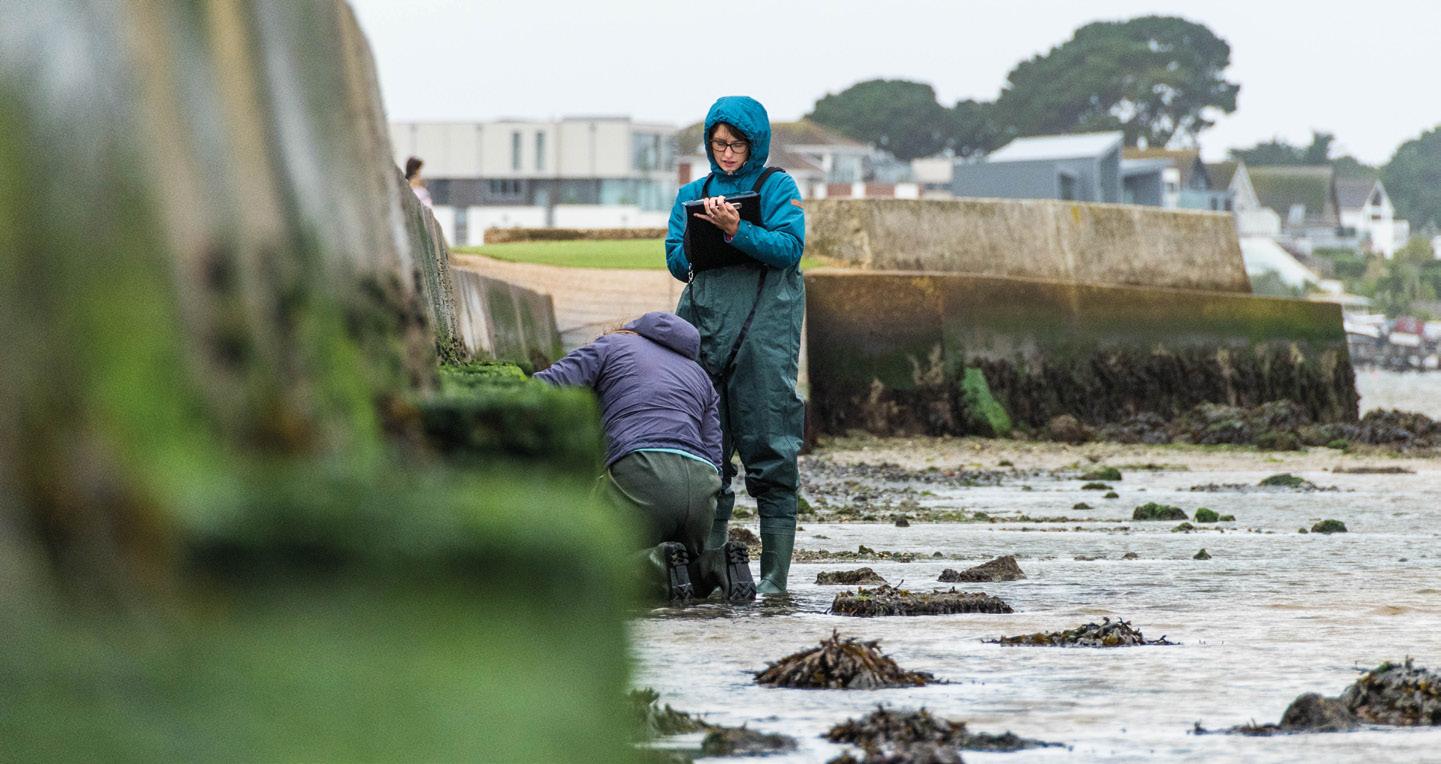
Sustainable water management
Sustainable water management is addressed within the Sustainable Development in Practice unit on the MSc Green Economy course. Students are required to consider the current status of the world’s water resources with a focus on fresh water, water scarcity,
links with economic development and health implications. Students then have the opportunity to examine potential approaches to sustainable provision of water resources, through the lenses of hunger and poverty alleviation, the interdependence of water and energy, and policy development.
THE Impact Rankings 2024 result
56th in the world 3rd in the UK
77.8 Research score out of 100
45% programmes aligned to this UN Sustainable Development Goal
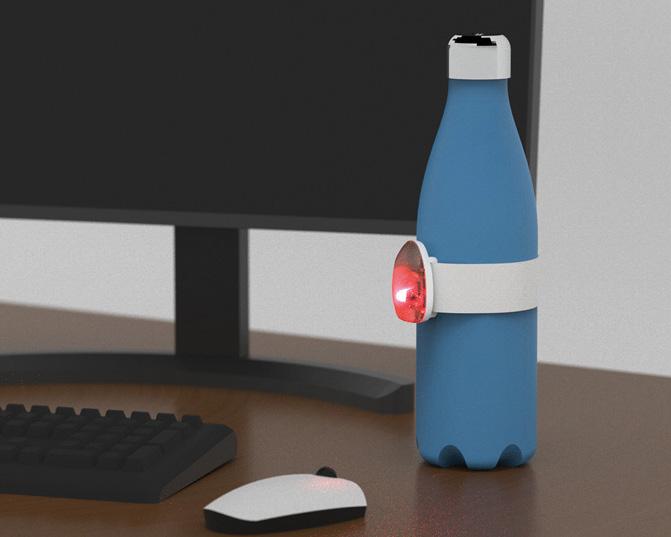
Created by MDes Product Design student Harry Gwynn, TiLT iT is a water bottle attachment intended to make drinking habits more visible to the user, therefore encouraging healthy drinking habits. It also promotes the use of a reusable water bottle.
TiLT iT works through the use of three LED lights that will progress from green to red over a 20- or 40-minute period as selected by the user. It is intended to operate without interfering with the user’s daily tasks by harmonizing with the environment in its ‘happy’ green state and becoming progressively more intrusive over time in the `lonely` blue and then `angry` red states. This will make the user more aware of their personal drinking habits and prompt the drinking of water regularly.
Improved Water, Sanitation, and Hygiene (WASH) facilities in schools
Professor Edwin van Teijlinggen, Professor of Reproductive Health, has been working with academics from Nepal to assess whether introducing WASH facilities in schools in Nepal influences the educational achievements of pupils. This study revealed a significant association between improved school WASH facilities and basic-level students’ educational achievements, corroborating the significance of prioritizing and investing in comprehensive WASH infrastructure within educational settings.
Environmenstrual Collective
We worked with our Students’ Union and Vice President Welfare & Community to launch the Environmenstrual Collective The Collective is a social space and initiative which promotes sustainable period products, tackles period poverty
BU have partnered with City to Sea to become the first ‘Refill Campus’, by pledging to take steps to ensure that all our buildings are free of single-use plastic. You can see our commitment to becoming a Refill Campus from the eye-catching artwork on 45 of our water refill points across BU, making it easier for students and staff the find a refill point and use their reusable water bottles.
and breaks the taboo around menstruation and sexual health.
Menstruation stations across Talbot, Lansdowne, and Portsmouth have successfully been set up as a result of the collective.
BU has introduced rainwater harvesting systems (RWHSs) in our new buildings; Fusion Building, Poole Gateway Building, and Bournemouth Gateway Building. RWHSs capture rainwater which we then use to supply the toilets instead of treated drinking water, saving energy whilst also reducing the potential for flooding on campus.
Stephen Jones, Head of Facilities Management at BU, welcomed the initiative saying, “We are committed to eliminating single-use plastics from our campuses. We know that this is not only key in terms of minimising waste and litter, but it is also essential as we play a wider role as custodians of the campus and collectively responsible for the local natural environment. Our vision is a not just a university free from single-use plastic – but one where BU plays a leading role in bringing about regional action in tackling this persistent environmental problem.”
Gateway Building
used in 2022-23
Building
used in 2022-23
Bournemouth Gateway Building 13%used in 2022-23
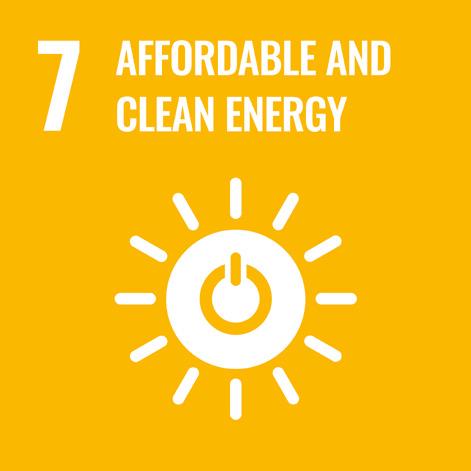
Ensure access to affordable, reliable, sustainable and modern energy
Bournemouth University helps to protect and preserve a sustainable environment
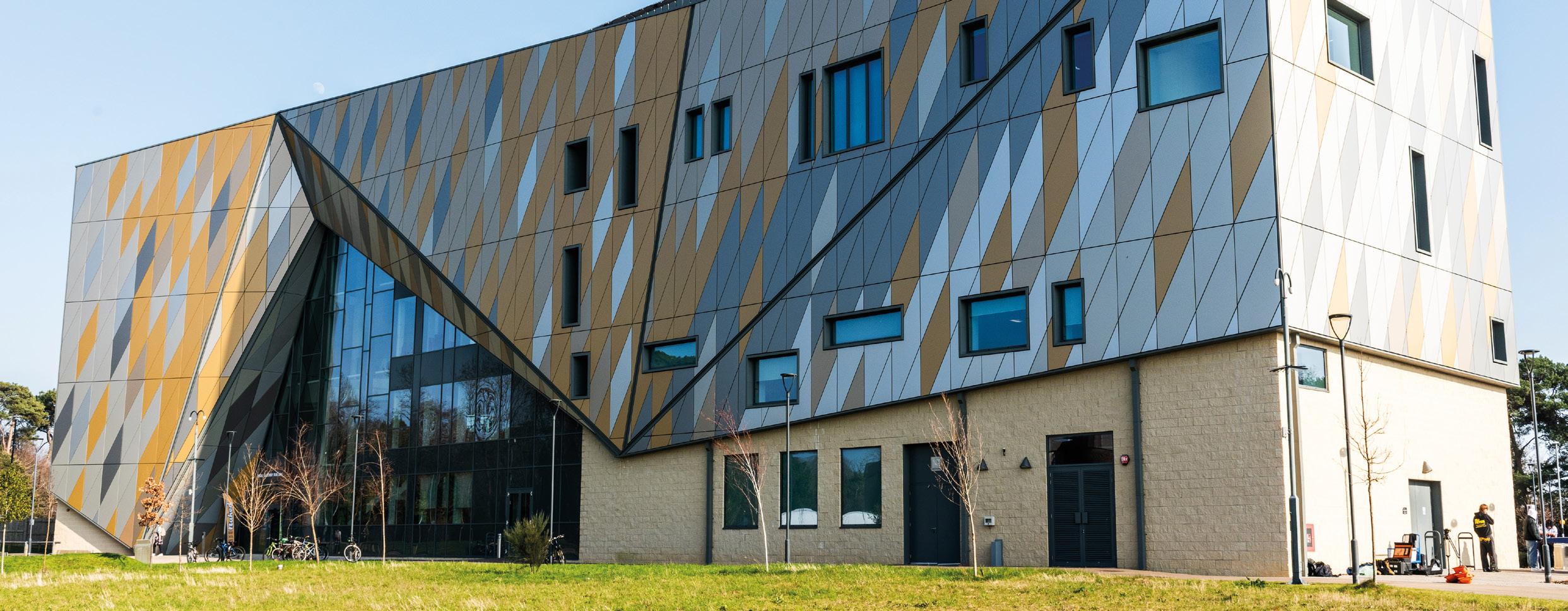
This Green Technology & Renewable Energy short course examines the environmental and social impacts of different technologies, to evaluate critically which approaches might truly be considered ‘green’.
Students consider the main environmental, political, and socio-economic drivers for the development of green technology and examine how these challenges are being met through scientific and technological innovation in addition to the potential conflicts that can arise through the implementation of such technology. As a result, students gain a comprehensive introduction to this rapidly developing field and its relationship to broader society.
This Level 4 unit is a core unit in our Design Engineering and Mechanical Engineering programmes. The unit embeds alternative energies and sustainability within its two main themes of solid mechanics and thermofluids, including through a series of lectures covering energy efficiencies and cost benefit ratios through conversion and heat transfer. The unit aims to provide technical understanding of energy, including design principles of solar panels, but also aims to dispel some of the myths around the topic and educate on the broader environmental topic.
201-300 in the world
61.5 Research score out of 100
This work is reflected within a Master’s unit, Knowledge Transfer, which more readily links energy efficiency and low carbon energy within the context of different cultures which have varied takes on sustainability, energy demands and capacity. THE Impact Rankings 2024 result
19th in the UK
54% programmes aligned to this UN Sustainable Development Goal
Run-of-river micro-hydropower plant at Durweston Mill
MEng Mechanical Engineering student
Charlie Bill has been investigating the potential for installing hydraulic turbines at an old mill site. Charlie used data collected on site to develop computer-aided-design (CAD) models of the millrace and sluice gates in order to simulate the rivers flow. He then used Computational-Fluid-Dynamics (CFD) to aid the design of bespoke turbines allowing them to be optimised to achieve the maximum power generation available at this site.
Charlie said, “Thanks to recent innovations in small hydraulic turbine technologies, hydropower can be introduced at sites with very low head and low flows where they were not feasible before. It is important now that we focus on exploiting our small-scale hydro resources in the UK to help reach net-zero emissions by 2050.”
The rise of sustainable technologies
The Commercial and Maritime Law Research Group (CMLR) explores the emerging fusion between technology and law in International Commercial and Maritime law.
In spring 2023, the CMLR organised a conference called ‘The Rise of Sustainable Technologies: Legal, Commercial & Policy Implications.’ Three profound speakers discussed sustainable technologies from different perspectives.
Ms Líssia Queiroz De Menezes discussed the concept of green hydrogen technology & global energy crisis and, the legal conundrums in international commerce, specifically the lack of a globally accepted form of regulation for green hydrogen. Professor Ekins’ (OBE) presentation focused on assessing the urgency for an enforceable international legal framework to regulate the provision of infrastructure which can reduce carbon emissions in the face of the global warming crisis which is now an existential threat to planet Earth. Ms Michelle Schiott’s presentation focused on hydroponics technology as the revolutionary concept for alternative farming methods.
Our approach to energy monitoring and energy projects has enabled us to win this award from the Energy Management Association (EMA). We also contributed an article to the EMA special magazine for International Women’s Day which featured women in the energy sector. You can read the article on page 18.


We have continued to increase our on-site renewable electricity generation capacity since 2012. In March 2023, we added a huge new solar array (made up of 263 solar panels) on top of Poole House, which will generate around 100,000kWh every year. The new system is expected to save over 20 tonnes of CO₂e each year, equivalent to 15 return flights to New York from the UK. With this new system we are now able to meet 6% of our electricity needs through on-site solar PV.
This year, we installed a new entrance for our library which will reduce heat loss from the entrance as the previous doors were highlighted as causing substantial heat loss. We also installed a new roof on our Dorset House building with much improved insultation.
These projects support our new Campus Heat Decarbonisation Plan which was funded by the UK Government Low Carbon Skills Fund. It identifies projects to switch away from fossil fuel heating to lower carbon options.
During 2022-23, we installed more than 600 LED light fittings across the Talbot Campus. This is estimated to save around 4 tonnes of CO₂e per year and approximately 16,000kWh.
BU data centres are responsible for 12% of our total electricity use. The Sustainable IT working group meet bi-monthly to address sustainable IT issues such as reducing emissions and increasing efficiency, and to support the delivery of the Sustainable IT Policy
We have a target of 15% reduction in power consumption of IT equipment in data centres by 2025/26. This year, IT have replaced some data centre equipment with new technology which is expected to use around 50% less power.
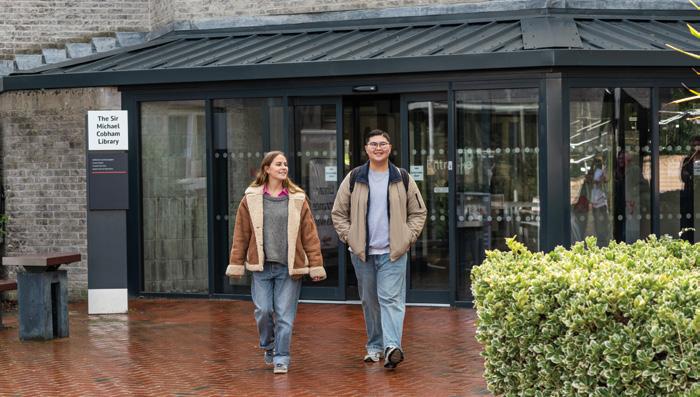
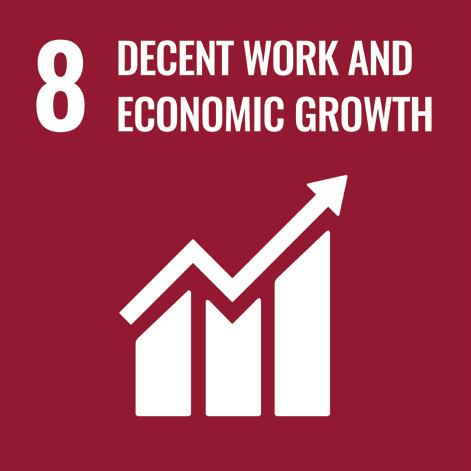
Promote sustained, inclusive and sustainable economic growth, full and productive employment and decent work for all
Bournemouth University helps to prepare for and recover from crisis
Bournemouth University is acting as a catalyst for growth, using our skills and expertise to boost skills and advance the region
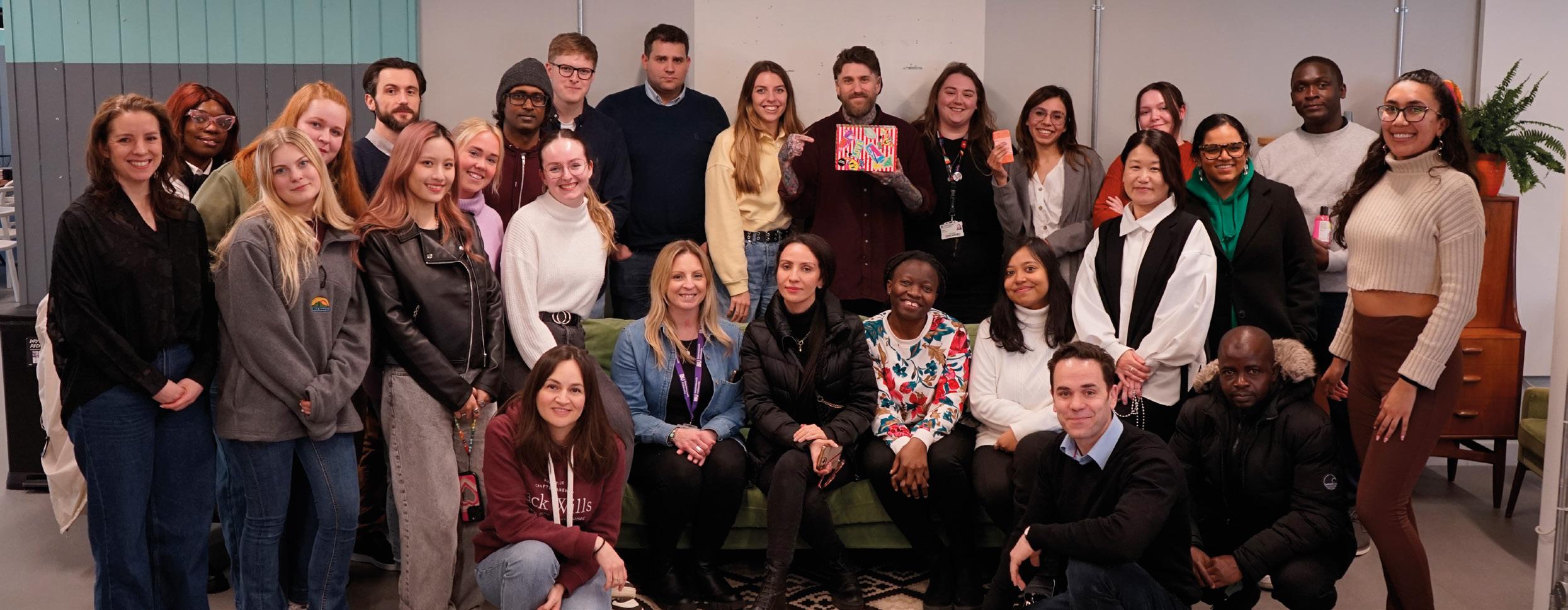
The Globally Responsible Business Practice unit is offered within our Business School to two of our biggest programmes.
It aims to put ethics at the core of our thinking about business globally and generate insightful thoughts on sustainable business practices, stakeholder engagement and the importance of accountability in the relationship between businesses and their various stakeholders. It uses case studies of corporates practice, Corporate Social Responsibility (CSR) theory and cutting-edge contemporary developments to examine how business aligns to the UN SDG agenda.
The UN SDGs were embedded within the programme design, with lectures linking business practice to the SDGs and seminar case studies explicitly referencing corporate action in respect of key SDGs. Within their assessment, students research current sustainable development challenges for specific companies, which
enable a detailed exploration of businessrelated impact and solutions to improve sustainability at the level of communities, industry and global practice.
The MSc Sustainable Economic Development & Emerging Markets programme requires students to examine the issues surrounding sustainable development involved in emerging market economies and become equipped with the skills to analyse, understand and interpret data to address significant issues facing humanity.
With content covering sustainable regional development, global economic challenges and entrepreneurship, students graduate understanding pervasive, contemporary and emerging issues in sustainable and ethical economic development, as well as how to address them innovatively and critically.
THE Impact Rankings 2024 result
9th in the world
2nd in the UK
83 Research score out of 100
78% programmes aligned to this UN Sustainable Development Goal
The Centre for Sustainable Business Transformations (CSBT) delivers cutting-edge interdisciplinary research and knowledge exchange that address the needs of businesses, policy and society to help generate prosperity and address the UN SDGs.
The centre has a diverse mix of multidisciplinary experts in economics, management, accounting, tourism, and marketing, among others, who collaborate to produce new knowledge on sustainable business models, sustainable entrepreneurship, and sustainable supply chains, to name a few. The CSBT also addresses the pressing issues surrounding gender inequality and the representation of ethnic minorities in business to foster societal equity and sustainable business.
In June 2023, the CSBT hosted a sustainability expo to highlight why businesses should align with the UN SDGs to help boost economic growth.
Labour markets and innovation during times of war and reconstruction
In 2023, academics from the BU Business School attended an online economics workshop on transition economics. Academics from Ukraine, Germany and the USA were also a part of this workshop. A key topic discussed was the impact of conflict in Kyiv on academic output publications, and the implications for national innovation.
It was concluded that the BU Business School needs to develop existing relationships and build new connections in order to manage transition economies.
Managed by CareersBU and industry partners, the Graduate Skills Programme (GSP) is a free employability programme available to all students at BU.
Through this programme, students have access to a variety of industry-led masterclasses, online learning resources, and extra-curricular opportunities.
To obtain the Graduate Skills+ Award, students must attend one Graduate Skills Masterclass, complete two activities or resources, and write one reflection for each of the four stages: self-awareness, explore options, gain experience, and preparing to apply.
Samantha, a student who took part in the GSP, said “The programme has encouraged me to fully immerse myself within university life and given me the chance to participate in activities and events that I would otherwise have not had the opportunity to do”.
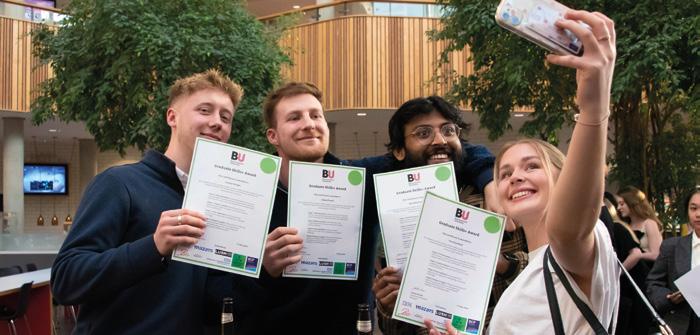
Fairtrade ensures small scale producers in developing countries get better prices, decent working conditions and fair terms of trade. This allows farmers and workers to thrive in their communities by protecting their environment and livelihoods. BU has been a Fairtrade University since 2006 and is one of only three 3-star Fairtrade Universities in the country.
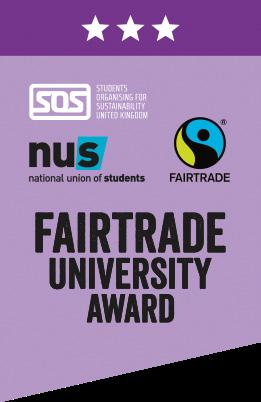

As part of International Women in Engineering Day, BU’s Department of Design & Engineering organised a Women in STEM (Science, Technology, Engineering, and Maths) networking event to help raise the profile of career opportunities that are available to girls and women in this industry. Women in STEM also encourages women and girls to enter these fields as part of their education.
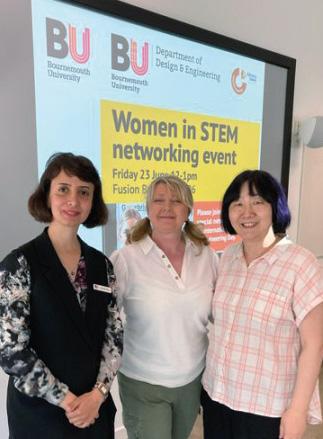
Dr Roya Haratian, Principal Academic in Electronic Science and Engineering who helped organise the event said, “International Women in Engineering Day is the perfect opportunity to hold our networking event. The students are able to publicly display their products and designs, as well as meet and network with visitors from local businesses. There are a whole range of exciting new inventions and designs that have both a practical and environmental use for society.”
We have stocked Fairtrade across our outlets and aim to champion it to our students, staff and visitors through a series of engagement activities throughout the year.
We recognise that what we purchase as a university is a high-risk area for sustainability. Therefore, our Sustainable Procurement policy states that we include in all tenders over £25,000 questions addressing environmental and social sustainability with a default score weighting of 15% to ensure our commitments are reflected in what we buy.
We are also committed to working with suppliers where possible to reduce the environmental and social impacts of their goods, services and works.
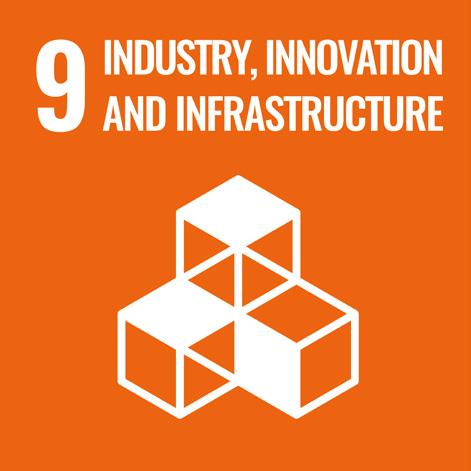
Bournemouth University helps to protect and preserve a sustainable environment
Bournemouth University is helping creative and cultural heritage to thrive
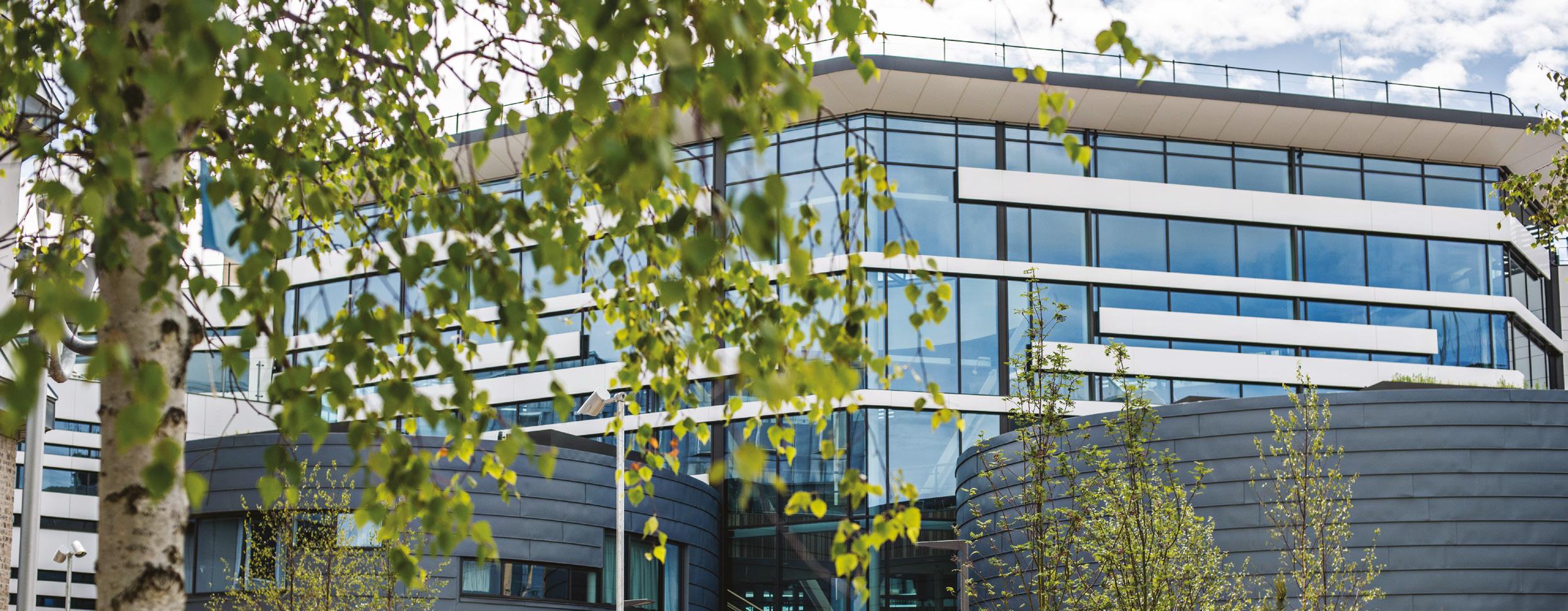
The Hacking for Sustainability (H4S) module is an opportunity for Business & Management students to generate new solutions to help solve industry sustainability problems. In doing so, students have the opportunity to develop skills in interdisciplinary teamwork, experiential learning, mentorship, and innovation. In 2023, students worked on presenting solutions to issues surrounding national security, natural disasters, energy and the environment, which have now been implemented by the Ministry of Defence (MoD).
Unit Leader for the H4S module, Dr Mili Shrivastava said, “The essence of the course is to challenge thinking and provide fresh perspectives. We are proud to have equipped students to work in a fast-paced, real-world setting, with mission-driven organisations such as MoD.”
The MSc Innovation Management & Entrepreneurship programme encourages students to develop an entrepreneurial mindset by fostering creativity, design and new ways of thinking.
Students have the opportunity to learn how to implement design management principles, explore innovative culture and governance in a variety of business contexts, and work on a real-life project to put theoretical principles into practice.
Bournemouth University is acting as a catalyst for growth, using our skills and expertise to boost skills and advance the region THE Impact Rankings 2024 result
601-800 in the world
26th in the UK
35.4 Research score out of 100
82% programmes aligned to this UN Sustainable Development Goal

Dr Kaouther Kooli, Principal Academic in the Department of Marketing, Strategy & Innovation, has been incorporating theoretical concepts of sustainable development and climate action into the Marketing Communications & Brand Management unit via discussions, exploring case studies, handson activities, guest speaker sessions, and promoting participation in sustainability advocacy.
Dr Kooli has also given her students tangible opportunities for action. Students worked in collaboration with real local businesses including aDoddle.org, Body Positive Dorset, Linda Makeup Artist, and Gaia Card, and were tasked with developing a comprehensive marketing communications plan, implementing it, and evaluating the results.
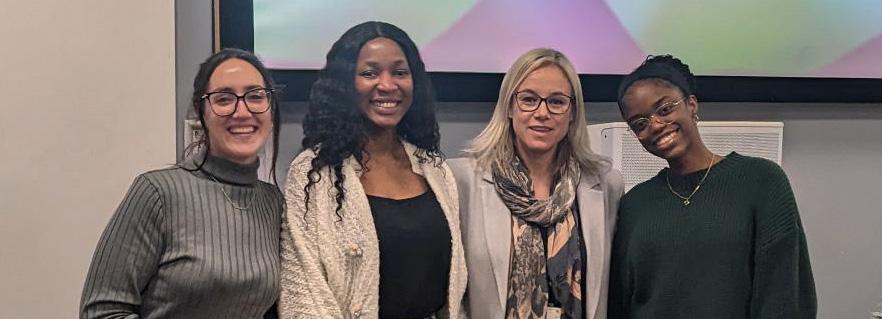
This year, the BU Sustainability team collaborated with the Computing and Informatics department to host a Net Zero Hackathon for BU students.
The Net Zero Hackathon was a chance for students from across disciplines to work together in teams to develop a prototype interactive game for young people to explore sustainability and climate change, with a focus on the BU Estate. The 32 students that took part were given real BU building energy data to work with, and were required to align their submission to computing, cyber security, and data analytics.
The Festival of Design and Engineering is a showcase exhibition where BU students’ creative skills, designs and prototypes are displayed to industry, commerce, friends, family and the public. The students have an opportunity to talk about the latest technologies they have employed to design solutions to real problems, encompassing market need, function, sustainability, style and aesthetics.
The winning team developed an interactive map of campus coupled with an engaging game aimed at educating individuals, especially children, on the journey to achieve net-zero buildings.
Iris Compan Del Monte, BU student from the winning team, said “I am proud of our teamwork, creativity, and the positive change we are trying to bring to our community and beyond”.
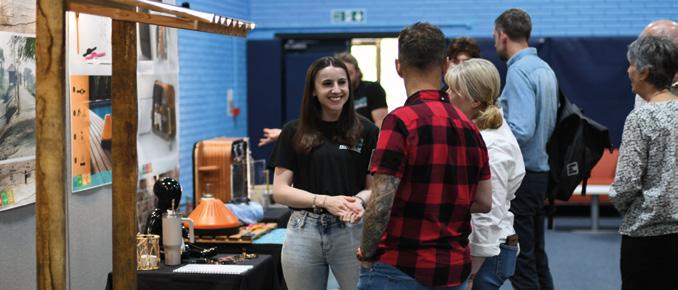
One example of a student project from 2023 include ‘just-lock’ by Product Design student Josh Taylor, which is a 3-in-1 bike lock that aims to prevent and deter opportunistic thieves from stealing e-bikes used by delivery couriers.
The Centre for Sustainable Business Transformations (CSBT) at BU hosted an event titled “Powering Innovation”, bringing together industry, academia, and government to explore the impact of Knowledge Transfer Partnerships (KTP) on business innovation.
Professor Marcjanna Augustyn, Head of CSBT, highlighted the centre’s interdisciplinary expertise and commitment to supporting businesses in developing sustainable models, technologies, and strategies through collaboration.
The student owned business fair was set up for BU students and alumni to exhibit their own business ideas and start-ups. The students also had the opportunity to win £750 worth of business support, and to gain some advice about setting up their own businesses from other exhibitors, including Dorset Growth Hub, Barclays Eagle Labs, BU Business School, and BU Careers. Masterclasses were held to support the students, including ‘Employee to Employer’, ‘Managing cash flow’, and ‘Tips on gaining followers on social media’.
The ground floor of Dorset House has undergone a significant transformation by remodelling and modernising the space including creating a new, more welcoming entrance for staff, students and visitors, with more collaborative spaces.
This has been completed to Building Research Establishment Environmental Assessment Methodology (BREEAM) refurbishment Very Good standard, including reusing existing furniture by reupholstering old chairs, replacing the roof with new insulation and improving some glazing.
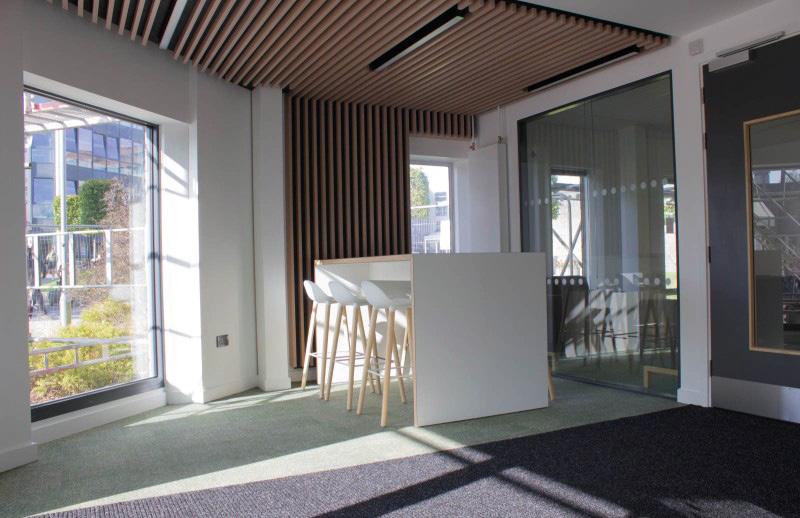
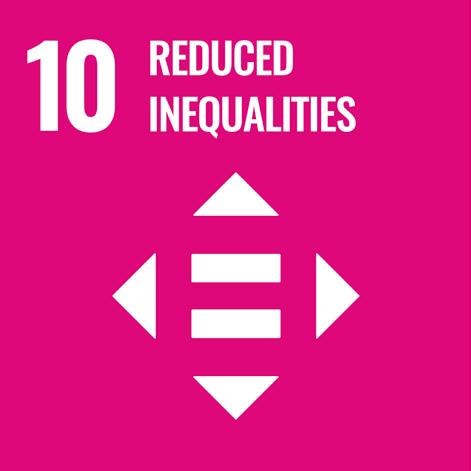
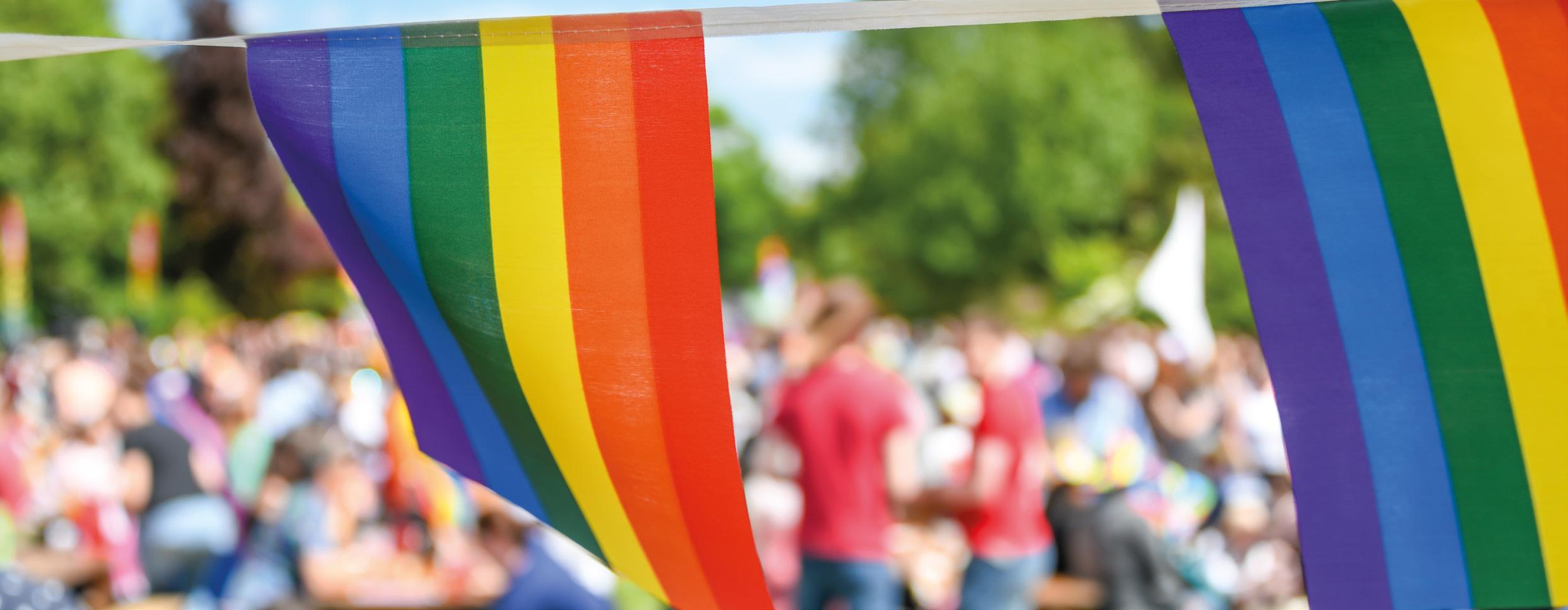
Bournemouth University challenges marginalisation, misinformation and under-representation THE Impact Rankings 2024 result
This unit explores the nature and impact of possible causes of social exclusion and discrimination, and provides an introduction to sociological and anthropological enquiry.
Julia Armstrong, Lecturer in Social Work, explores the LGBTQ+ community within this unit by looking at this community of people from a historical and political context, but also looking at what is being said in the media, what we can learn from people’s lived experience, and what we can do as social workers, activists and allies. Julia invited Level 6 student Tommy Guy to come and speak to Level 4 students about his social justice project looking at Transgender Rights.
This unit, taught within our Humanities & Law department, explores how citizens of democracies think and feel about their society, its institutions and how feelings shape societal dynamics.
Understanding inequality is at the heart of the unit. Citizens feel less represented if they feel they have less value. They then have lower trust in political institutions, lower engagement with democratic processes, they are less well-informed and often exhibit anti-democratic tendencies. Inequalities are thus often the root causes of populism, division and polarisation. Discussions explore intersectional inequality, with students encouraged to critically assess the structure of societal hierarchies and their own place within them. They consider who might feel marginalised and how this impacts political engagement, aiding the students to develop empathetic and informed perspectives that can help reduce inequalities and strengthen civil society.
101-200 in the world
37th in the UK
74.2 Research score out of 100
85% programmes aligned to this UN Sustainable Development Goal
Perception of the Black, Asian and Minority Ethnic (BAME) acronym
Dr Keith Parry and Dr Emma Kavanagh from the BU Business School collaborated with other universities to investigate how the BAME acronym is perceived within the sporting industry. This study involved interviews with women from these communities who were working in the hyper-masculinised and whitedominated sporting industry, thereby privileging the voices of those who are traditionally omitted.
Three themes were identified: rejection and indifference towards the BAME acronym, filling in the form (inadequacies of the system) and, making up the quota (perpetuating work-related insecurity). The findings highlight the potential for the BAME acronym to cause distress and alienation.
PhD student Aziean Binit Jamin has been investigating disability inclusion within supply and demand chains of hospitality and tourism (H&T) organisations. The aim of this research was to evaluate the current landscape of disability support and interventions, to identify existing gaps, and to recommend novel perspectives for scholars and practitioners in H&T field to foster disability inclusion.
The research revealed that disability inclusion focuses heavily on customer disabilities, with scant research on disability inclusion in H&T employment. This study therefore emphasises the critical need for empirical research into the varied disability employment ecosystem within H&T organisations, focusing on social integration for inclusive workplaces.
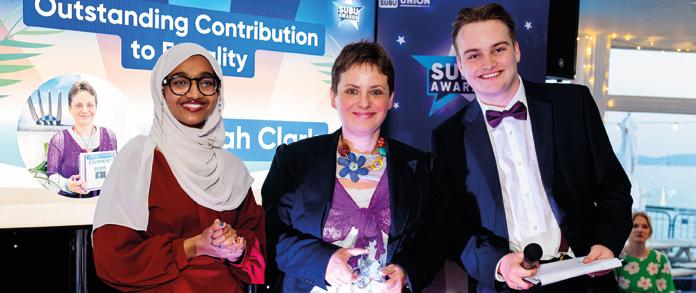
Sarah Clark, winner of SUBU’s Outstanding Contribution to Equality 2024, volunteers with the EDS International Consortium (Psychiatric Aspects Group), serves on the CQC Mental Health Advisory Board, and recently took part in a Human Library for the Psychology Department Staff Training day on “Equality, Diversity and Inclusivity”. Sarah speaks out against social injustice and stigma, promoting autism awareness, having been featured in Hotpod Yoga’s “Move With Purpose Campaign” speaking about how her MSc course led to her autism diagnosis. She is a keen patient advocate and also promotes neurodiversity awareness amongst BU staff and students, taking part in the BU Marketing Away Day Human Library as a Student Ambassador and has written various BU Student Blogs.
February is LGBTQ+ History Month in the UK. To mark the occasion, BU ran ‘Rainbow Office Hours’ throughout the month to provide a safe space for all staff and students to talk in confidence with BU LGBTQ+ staff and allies, face-toface or online.
SUBU celebrated the month with a variety of activities to explore the history of the LGBTQ+ community and provide space for LGBTQ+ students to celebrate their “being”, both historical and present. Activities included a LGBTQ+ history quiz, tote bag making, a family dinner night, a clothing swap and HIV fundraiser, and drag bingo! This work is led by your LGBTQ+ and Trans, Non-Binary, Intersex and Gender Identity + Officers with support from SUBU staff, clubs, societies and Nerve Media.
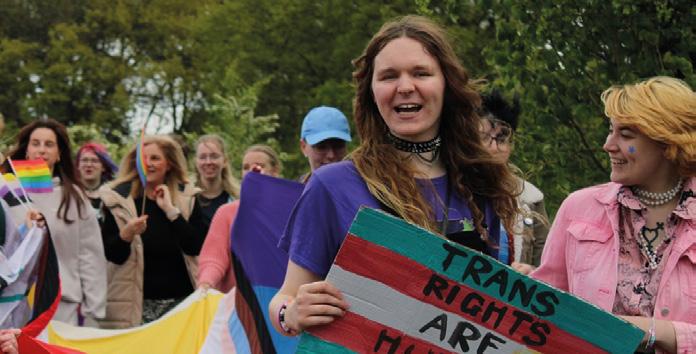
Equality commitments at BU
Inclusivity is a core value that underpins the BU2025 strategic plan. We are proud of our increasingly diverse community and continue to work to take action to address gaps and challenges in equality, diversity, and inclusion in order to support development, progression, and achievement for all.
We have implemented a range of development opportunities to support academic pay progression and promotion, with specific events aimed at women, and to raise awareness of bias and workplace adjustments to address disadvantage. We have also made available to staff.
We have signed up to several national equality schemes, including the Mindful Employer Charter; Athena SWAN; the Race Equality Charter; achieving Disability Confident status; being a Stonewall Diversity Champion; and member of the Business Disability Forum.
We continue to support and participate in Black History Month, Pride, and International Women’s Day; the main aim of which is to promote diversity and inclusion, understanding, awareness and a feeling of belonging for all.

Since leaving BU, Satyen has been working as Managing Director of Technology at Edelman (UK), where he is responsible for advising clients and driving sector change in both technology and UK Diversity, Equity and Inclusion (DEI).
Satyen is also driving DEI change across the PR and communications sector, helps leaders and employees to better understand how to implement DEI strategies across their businesses, and is an advisory board member at Race Equality Matters, an organisation that established the UK’s first Race Equality Week in February 2021.
Diversity monitoring
12.86% of staff from an ethnic background
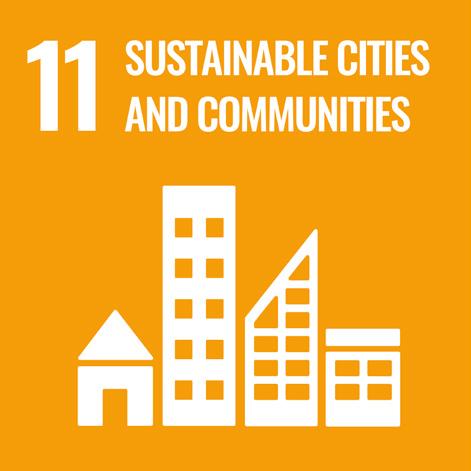
Bournemouth University helps to protect and preserve a sustainable environment
Bournemouth University helps to prepare for and recover from crisis
Bournemouth University is helping creative and cultural heritage to thrive

Taught within the MEng Engineering course, this unit uses a practical product dismantling exercise and specific software skills to support learning on material use, recyclability and carbon footprint of products during all stages of their life.
The process of dismantling and redesigning a product in a more sustainable way helps to engage students with the complexities and benefits of implementing sustainable design concepts, and the transferable skills allow the students to quantify the impact of these throughout their future careers. Much of a products environmental impact is decided at the design stage so it is crucial to equip the next generation of product designers with the skills and knowledge to take account of this if we are to build a truly sustainable future.
Available as a short course or integrated into our MSc Green Economy programme, this unit considers the international policy context relating to sustainable development and evaluates the relevant policy targets and goals.
Students also have the opportunity to explore the practical application of sustainable develop through a series of real-life case studies, including examples of sustainable cities. THE Impact Rankings 2024 result
101-200 in the world 19th in the UK
78.1 Research score out of 100
77% programmes aligned to this UN Sustainable Development Goal
BU research incorporated in new National Constitution for Local Disaster Management Committees in Sierra Leone
Led by BU’s professor Lee Miles, the Evaluating Local Disaster Management in Sierra Leone (EVALDIS) project, based at Bournemouth University Disaster Management Centre (BUDMC) in the Business School, has been cited and included in the new national constitution governing the workings and collaboration of local community disaster management committees (CDMCs) across Sierra Leone.
Encompassing wards across all 16 districts and five provinces of the country, and potentially covering over 8.4 million people. The new constitution of the CDMC association seeks to enhance the resilience of local communities in preparing for, responding to, and recovering from crises and disasters.
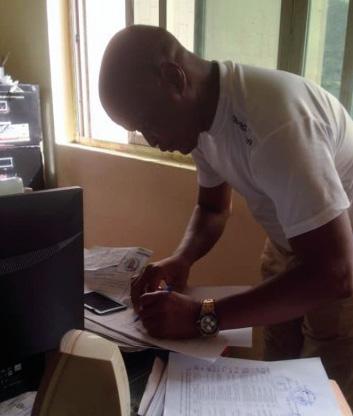
Professor Lee Miles said: “For any researcher, our primary concern is conducting research that responds to real-world needs and provides impact for people. Working with partners in Sierra Leone has ensured that the extensive knowledge we have on disaster management is being applied in the context of the specific, often societal, needs of the country”.
Geo-tourism facilities in disaster mitigation
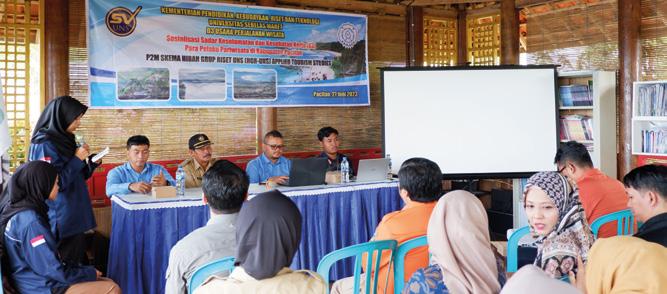
PGR student, Tomi Agfianto, has undertaken research that evaluates the mitigation of Gunung Sewu UNESCO Global Geopark from the natural hazards that may occur.
This research found that, despite that geo-destination operators have provided basic health needs such as first aid, standard medical room, ambulance, and other related services, tourism destinations generally require stronger governmental policy support, collaboration among stakeholders, and more non-structural mitigation.
Social and Scientific Uncertainties in Environmental Law
BU academics have collaborated with other universities to coauthor the book Social and Scientific Uncertainties in Environmental Law. This book explores how environmental law is prepared or could be better equipped to employ the best available knowledge and expertise, and addresses the knowledge gaps and uncertainties in the legislative, administrative and judicial branches.
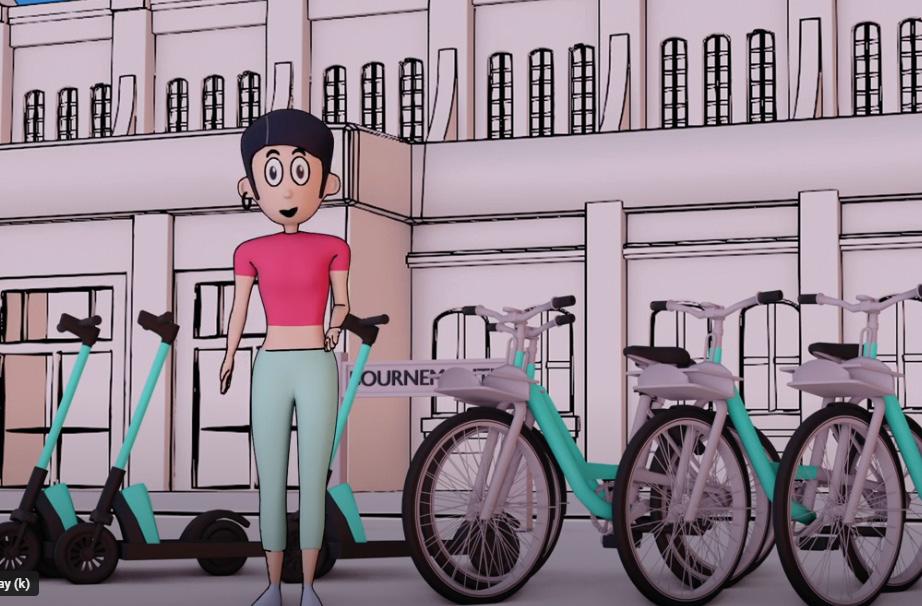
The Air We Breathe
Funded by Bournemouth, Christchurch and Poole Council (BCP), The Air We Breathe animation was produced to explain the
sources of, and risks associated with, particulate matter (PM2.5) and ways to mitigate atmospheric levels of PM2.5. This animation focuses on BCP’s recent introduction of e-cargo vehicles on the Bournemouth seafront, and advocates for sustainable active travel.
It was a collaboration between Joseph McMullen, a PhD candidate and Lecturer in Environmental Law & Science, Alain Simons, Senior Lecturer in Games Technology Programming, Dan Pierson, Demonstrator In Music and Sound Production, Millie Hamilton, a BU graduate, and voice actor Daniel Jones.
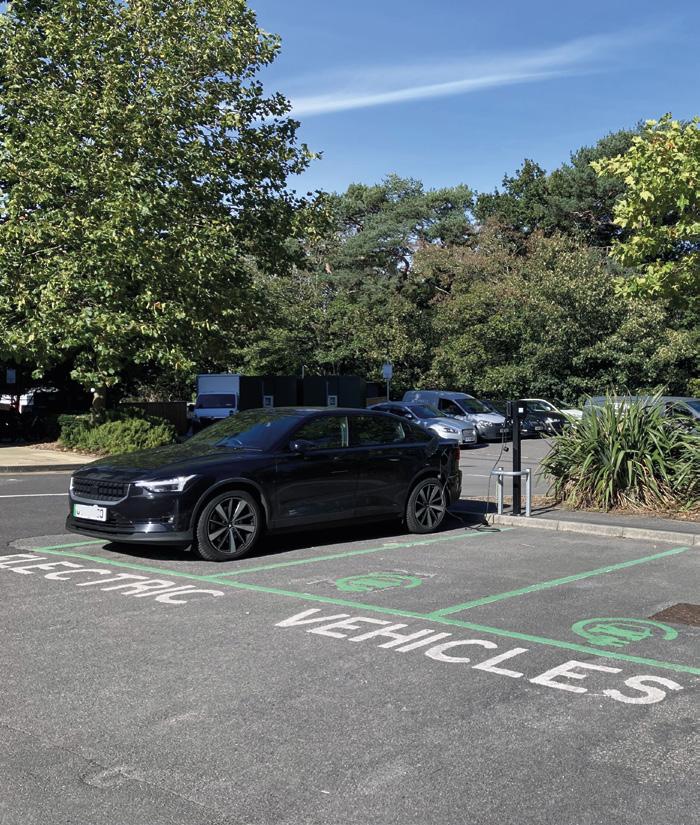
We have installed new EV charging points at both Talbot Campus (10 charging spaces behind Dorset and Christchurch House) and the Lansdowne campus (11 spaces at Bournemouth Gateway Building and Studland House) for staff use and the remaining three spaces are for estates vehicles. We hope staff will find the chargers easy to use and enable more staff to make the switch to electric vehicles over the coming years.
Our Travel Plan, which runs from 2019 to 2025, is a programme of measures, initiatives and infrastructure which aims to provide enhanced sustainable travel choices and opportunities for our students, staff and visitors when travelling to our campuses.
At the heart of BU’s Travel Plan is the sustainable travel hierarchy. This hierarchy identifies that active travel options including walking and cycling are the most preferable options in the hierarchy, followed by use of public transport and lift-sharing, with single occupancy car use at the bottom. It also identifies the benefit of remote working for avoiding unnecessary travel.
The Travel Plan is delivered through a series of measures such as UNIBUS services, Cycle to Work schemes, personalized travel plans, active transport facilities, strategic parking management, and travel related events and engagement such as the ‘Big Bike Sale’, the Love to Ride scheme, and our free Bike Doctor sessions.
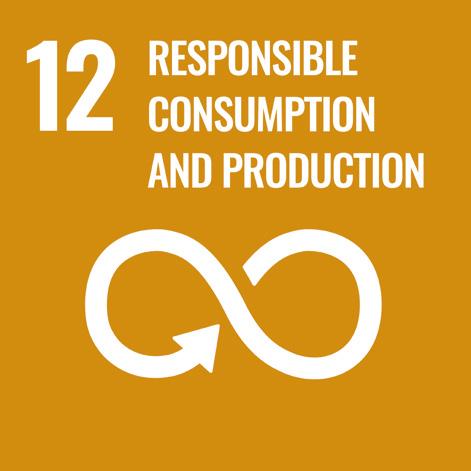
Bournemouth University helps to protect and preserve a sustainable environment
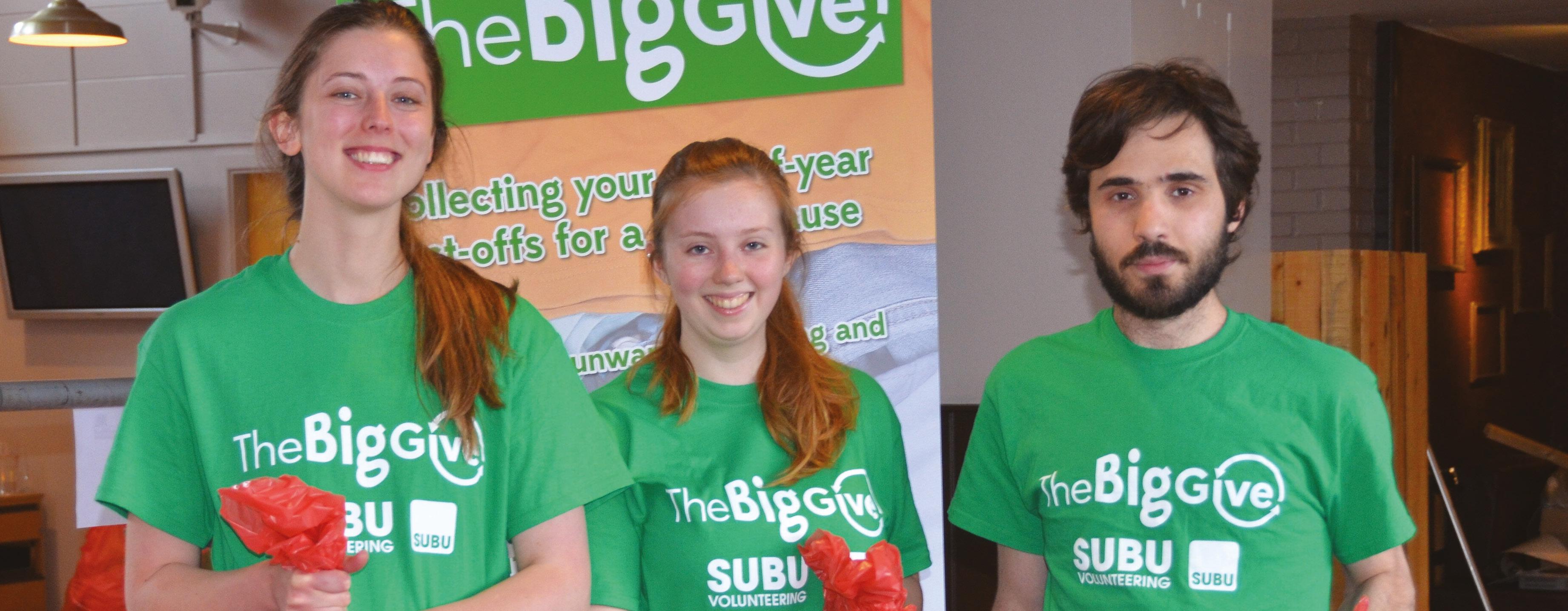
This final year unit on the BA (Hons) Marketing Communications course encourages students to consider the increasing challenge of attracting, developing, and retaining customers within a competitive environment, with a focus on responsible production and consumption. This unit also covers the topic of greenwashing.
Taught within the Senior Leader Apprenticeship course, this unit explores a range of contemporary issues and management challenges faced by organisations.
Dr Roberta Discetti, Senior Lecturer in Business & Management, discusses the Fairtrade movement as a key driver of consumer awareness and behaviour.
Bournemouth University helps to prepare for and recover from crisis THE Impact Rankings 2024 result
The MA Advertising course gives students the opportunity to work on live briefs set by real advertising agencies, and to develop the skills needed to lead brands in meeting the demands of consumers to address urgent social and environmental challenges.
Rutherford, Principal Academic in Creative Advertising, created an assignment brief for his students to develop a poster to inspire and encourage BU students to take action for sustainability at BU, that would noticeably improve the local environment. Several of the students chose to focus on driving better waste behaviours and recycling practices. The assignment submissions were displayed on the Poole House sustainability notice board.
1st in the world 1st in the UK
93.6 Research score out of 100
78% programmes aligned to this UN Sustainable Development Goal
The Centre for Sustainable & Socially Responsible Consumption (CSSRC) aims to promote and advance the understanding of sustainable consumption and socially responsible consumption through developing and delivering internationally renowned research.
The CSSRC provides a hub to explore and address topics, including Food & Nutrition, Socially Responsible Production, Societal Marketing, and more.
Single-use medical device circularity
Dr Matthew Edge, Sid Ghosh, and Dr Danni Liang have been investigating the potential of reprocessing Single Use Medical Devices (SUMDs) within the UK healthcare system.
They carried out interviews with industry logistic specialists to identify potential opportunities, challenges, and limitations of reprocessing SUMDs, and concluded that, while issues of safety, sterilization, and redistribution were raised, reprocessing SUMDs could offer cost savings, reduce raw material and manufacturing resources, lower greenhouse gases emissions, and create new jobs.
At BU, we are committed to following circular economy principles and the waste hierarchy. To reduce the use of disposable coffee cups on campus, the BU Sustainability Team and our catering provider Chartwells have collaborated to design a ‘Returnable Cup Scheme’.
This annual sustainability campaign run by our Students Union encourages and facilitates students to donate any unwanted goods from their houses and halls of accommodation to charity before they leave Bournemouth for the summer.
The 2023 Big Give collected over 2530 bags of goods (up from 1,093 bags in 2022) which were donated to the British Heart Foundation and are estimated to have raised over £28,420 for the charity.
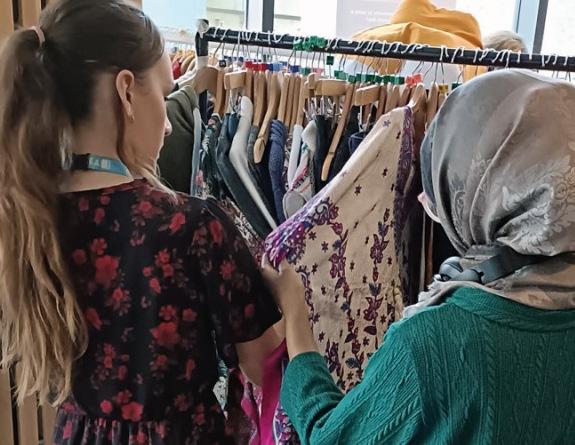
Prama UK collected over 500 bags from campus and street collections, raising over £7000 for the charity, and food was donated to City Gate Foodbank and the SUBU Community Kitchen
Nationally, the British Heart Foundation have diverted 2328 tonnes of stuff from going to landfill, raising £4,075,019 for BHF lifesaving research.

Co-founded by Dr Roberta Discetti, Senior Lecturer in Business & Management, SETS are a series of seminars open to academics, students, practitioners, social movements, and the non-specialist public. The aim of each seminar is to reflect with critical instruments and theories on socio-ecological transformations in times of crisis.
The spring 2024 SETS revolved around the global crisis of waste and the unsustainability of current modes of production and consumption, analysed across sectors and geographical contexts, in its societal, organisational, political, and ethical dimensions. Specific topics covered included ‘The Public Sociology of Waste’ and ‘Recycling Class: The Contradictions of Inclusion in Urban Sustainability’ and ‘The Social Life of Unsustainable Mass Consumption’.
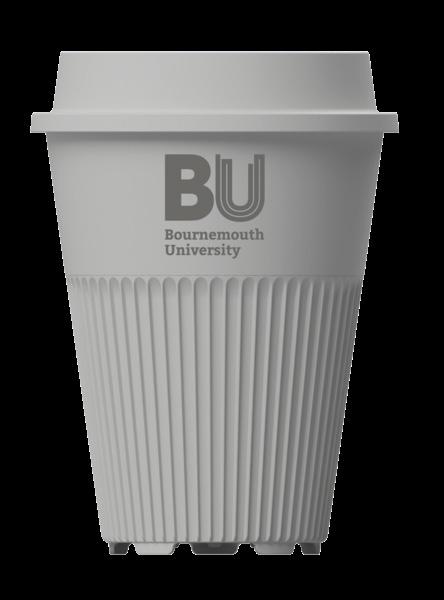
The goal is to address the barrier of people forgetting to bring their own reusable cup. Since launching the scheme in September 2023 to March 2024, the use of disposable cups has reduced from 95% to 78%.
Waste in campus bins increased by 27% since 2021-22 due to returning to campus post-covid, and our refurbishment projects across campus produced 132.5 tonnes more construction waste than in 2021-22.
Total non-residential (on campus) waste – 519.4 tonnes.
Tonnes recycled – 351.97 tonnes (68% recycling rate).
83% of construction waste recycled. We are working hard to drive down the amount of waste we produce per FTE students and staff. Our goal is to produce less than 20kg of waste per FTE, and for 2022-23, we achieved 14.07kg of waste per FTE.
To reduce waste on campus, we have three waste streams; general, mixed recycling, and food, and this year we introduced new
recycling streams for crisp packets, sweet wrappers, and stationery. In 2022-23, we recycled 10kg of crisp packets through TerraCycle. Our caterers, Chartwells, use crockery and metal cutlery in our catering outlets, and use Olio and Too Good to Go to redistribute leftover food. We also store spare furniture and reuse it where we can.
We were able to up-cycle the wooden benches as part of the project to replace the changing rooms at Chapel Gate sports campus, which helped us to avoid wasting the cedar wood. Slabs and bricks have also been cleaned and reused in the project. We have been able to reuse old cycle shelters by moving these to our Chapel Gate Sport campus to be used as shelters while watching sport.
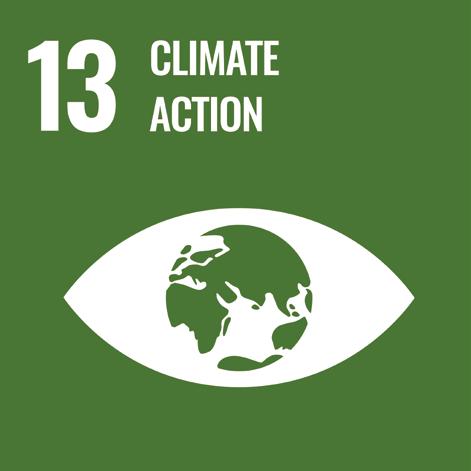
Bournemouth University helps to protect and preserve a sustainable environment
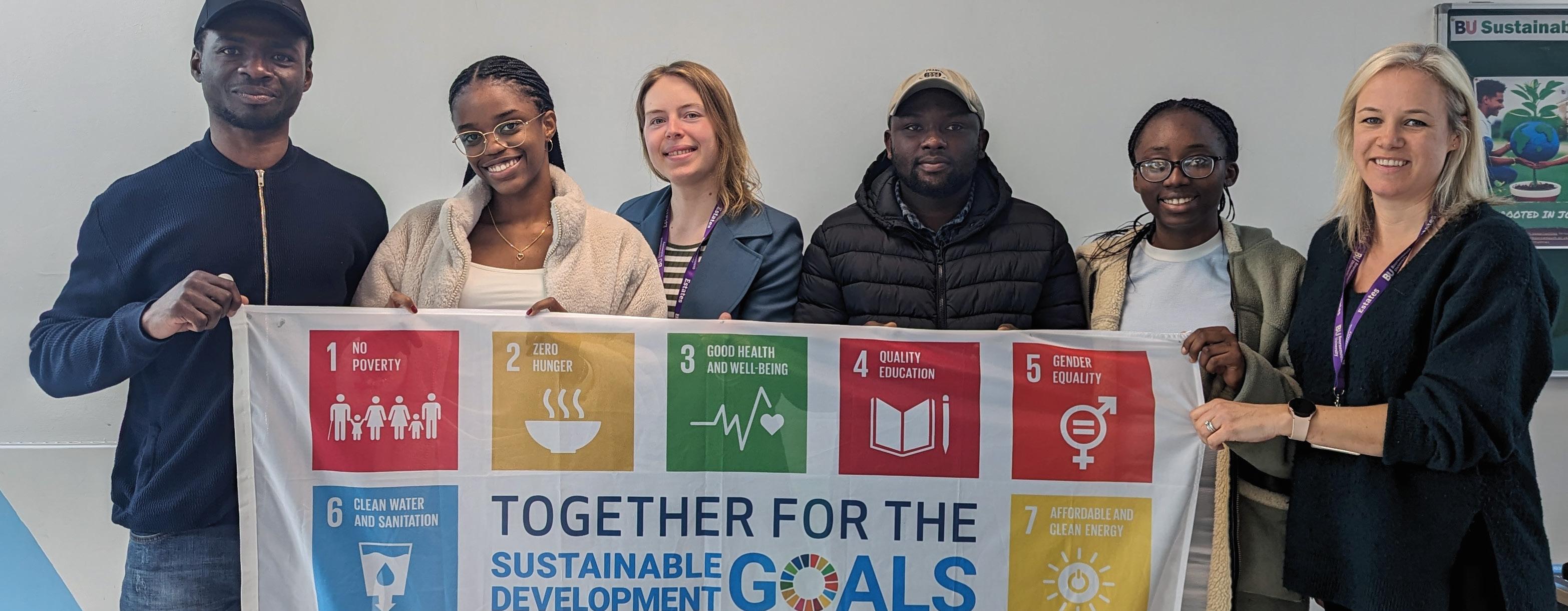
Within our Climate and Ecological Crisis Action Plan (CECAP) we have committed to embedding climate education within every level of every programme across BU in order to provide our students with the skills, knowledge and values to contribute to and lead the transition to a low carbon society.
As of December 2023, 62% of our programmes included the climate and ecological crisis somewhere within their content. To reach our target of 100%, whereby each student is exposed to climate action at each level of their study, the Sustainability Academic Network (SAN) come together regularly to share best practice around the integration of climate action into teaching. The SAN also have access to a ‘Climate Action’ area on our Brightspace VLE, which provides a guide for academics for achieving this goal, and demonstrates how SDG 13 is inter-related with the other 16 SDGs
Four of BU’s Humanities & Law students (two politics and two history students) took part in the British International Studies (BISA) Climate Negotiation Simulation in London in December 2023. This reproduces the negotiations held under the auspices of the United Nations.
Students represented one of the states that have signed up to current international agreements on climate change (e.g. the Paris Agreement of 2015 and the Glasgow Climate Pact of 2021). The simulation was overseen by Mark Webber, Professor of International Politics at the University of Birmingham and former BISA President. This opportunity offered students some hands-on, experiential learning, and enabled taste of what it is like to participate in international bargaining and negotiation while also raising their awareness of the politics of climate change.
THE Impact Rankings 2024 result
42nd in the world 11th in the UK
75.5 Research score out of 100
77% programmes aligned to this UN Sustainable Development Goal
A cross-faculty team including Dr Alan Kirkpatrick and Dr Tahani Mohamed from the Business School, and Dr Festus Adedoyin from the Faculty of Science & Technology, submitted written evidence that has been published as part of the report, titled ‘The financial sector and the UK’s net zero transition’.
This evidence included recommendations to address the economic welfare implications of carbon emissions pricing at a national and international level, and the issue of ‘carbon leakage’ - where businesses may try to save costs by moving production activities to countries with less demanding carbon pricing rules. They recommended the use of carbon border adjustment mechanisms (CBAMs), which are designed to reduce carbon leakage by applying charges to take account of variations in carbon prices ruling in different jurisdictions.

Climate change adaptation for biodiversity in protected areas Academics from the Faculty of Science & Technology produced research into the role of Protected Areas (PAs) for enabling biodiversity to adapt to climate change.
PAs may not be the best option due to shifting phenology, habitat alteration, and climate change, all of which would cause species to move away from reserves designated for them. However, this research shows that PAs do retain contracting species, acting as stepping-stones for expanding species of conservation concern and resisting invasion by vagrants.
BU collaborate locally with public and private sector organisations to drive towards net zero. BU are part of the ‘Dorset Public Sector Decarbonisation and Ecology Group’ which this year has involved knowledge sharing across important topics including electric vehicle charging, heat decarbonisation and sustainable procurement. We have contributed to the Local Area Energy Plan being produced by BCP Council and several BU academics and staff have collaborated with local organisation Zero Carbon Dorset who have created a vision for Dorset in 2030.
In November 2020, we became one of only a handful of universities to achieve a double certification for our EEMS.
Following an external audit by NQA in November 2023, our EEMS was re-certified to EcoCampus Platinum as well as both ISO14001 and ISO50001, which are international standards that recognise organisations that manage and enhance their environmental performance.
This EEMS system provides the policies and procedures which we all follow at BU. Our Sustainability Committee meets quarterly and provide governance to this work.
In February 2021, BU launched its Climate and Ecological Crisis Action Plan (CECAP)
In the CECAP, we pledge to achieve net zero emissions across all three scopes by the 2030/31 academic year. This includes a target to reduce its emissions by at least 50% since 2018/19, and embed climate action as a priority across our education, research and operations. So far, we have reduced emissions by 29%.
As part of this, we have joined the UN Race to Zero campaign: a commitment to pledge, plan, proceed and publish our journey to net zero emissions. Our environmental action until 2030 will increase in both pace and reach to achieve our target. You can read more in our CECAP Annual Report

Every year, we host Climate Action Week as an opportunity for students, staff and the broader community to join us in taking climate action.
The events and opportunities are designed to inspire and empower people to take climate action through learning, sharing knowledge, and discussion, but also through understanding how climate action can have positive effects on your mental and physical health.
This year we launched a new internal BU certification scheme to support and reward staff who are helping BU to achieve its targets set out in the CECAP.
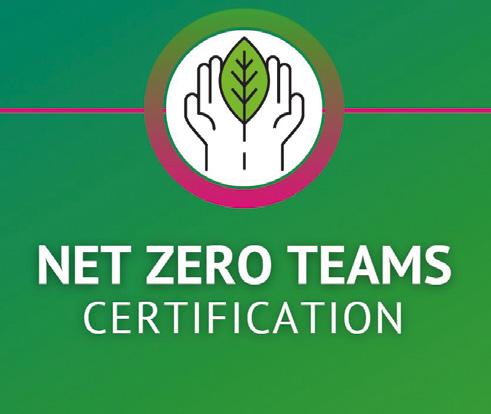
Net Zero Teams begins with a group of staff making a collective commitment to reduce their environmental impact. This is followed by the completion of up to 35 activities, categorised into: leadership, energy, travel, stuff, food, and connect. Teams can achieve up to 100 points, and become either a Bronze, Silver, or Gold certified team.
This approach increases carbon footprint literacy across BU and enables staff to aim their area and level impact in a way that suits them.
Shenel McLawrence, Senior Lecturer in Marketing Communications, has integrated the Carbon Literacy training into the Portfolio Unit for Level 6 Marketing Communication students. The 7 students certified this year will add to the previous 18 graduates that have left BA (Hons) Marketing Communications as Carbon Literate.
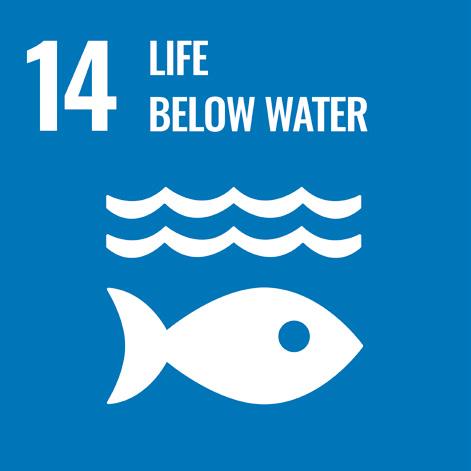
Conserve and sustainably use the oceans, seas and marine resources for sustainable development
Bournemouth University helps to protect and preserve a sustainable environment
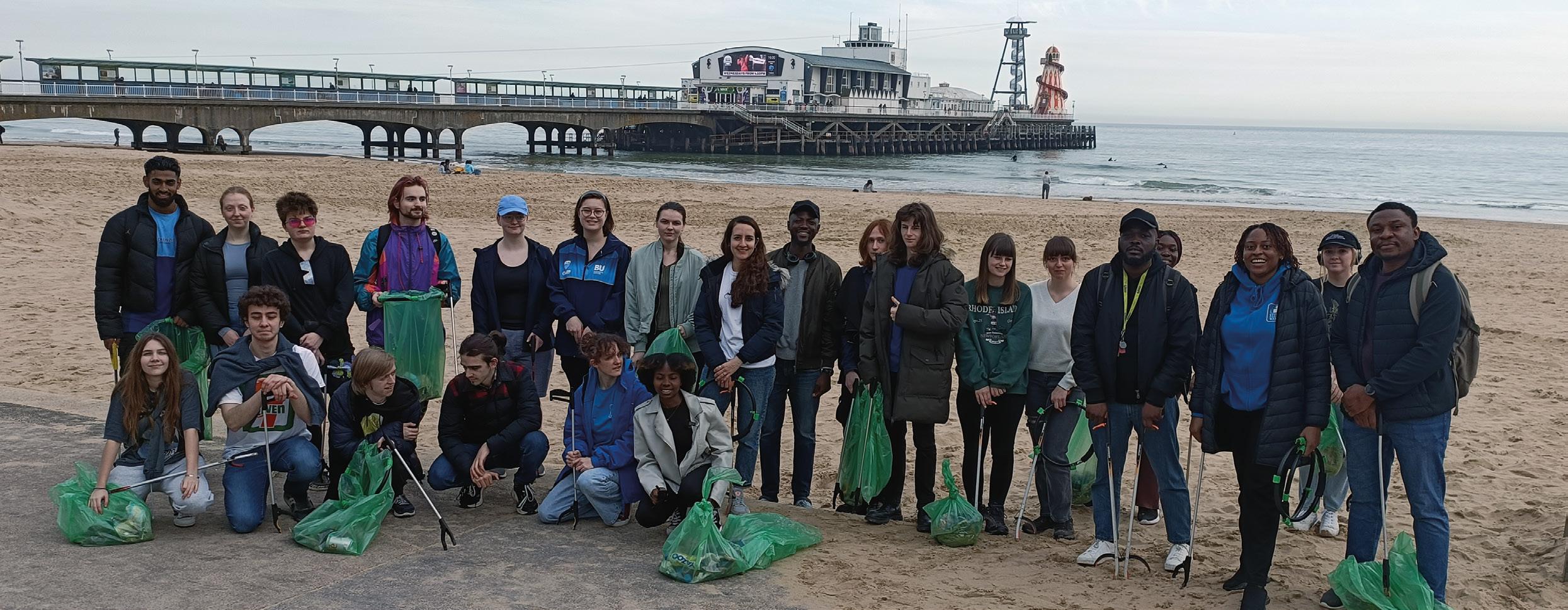
BSc (Hons) Marine Ecology & Conservation
The importance of the conservation and management of marine and coastal environments cannot be ignored, as human intervention and climate change increasingly impact on the decline of fisheries and protected areas.
The BSc (Hons) Marine Ecology & Conservation course introduces new contexts for understanding conservation in the marine environment, such as UK habitat directives and legislation and policy frameworks; explores a variety of themes and theories in marine ecology including an appreciation of the complexity of interactions in a marine environment; and recognises the ethical and legal dimensions of marine conservation and management. As a result, graduates are well-set to enter careers within national wildlife trusts, the Environment Agency, enforcement work or further research in order to conserve and restore our marine habitats.
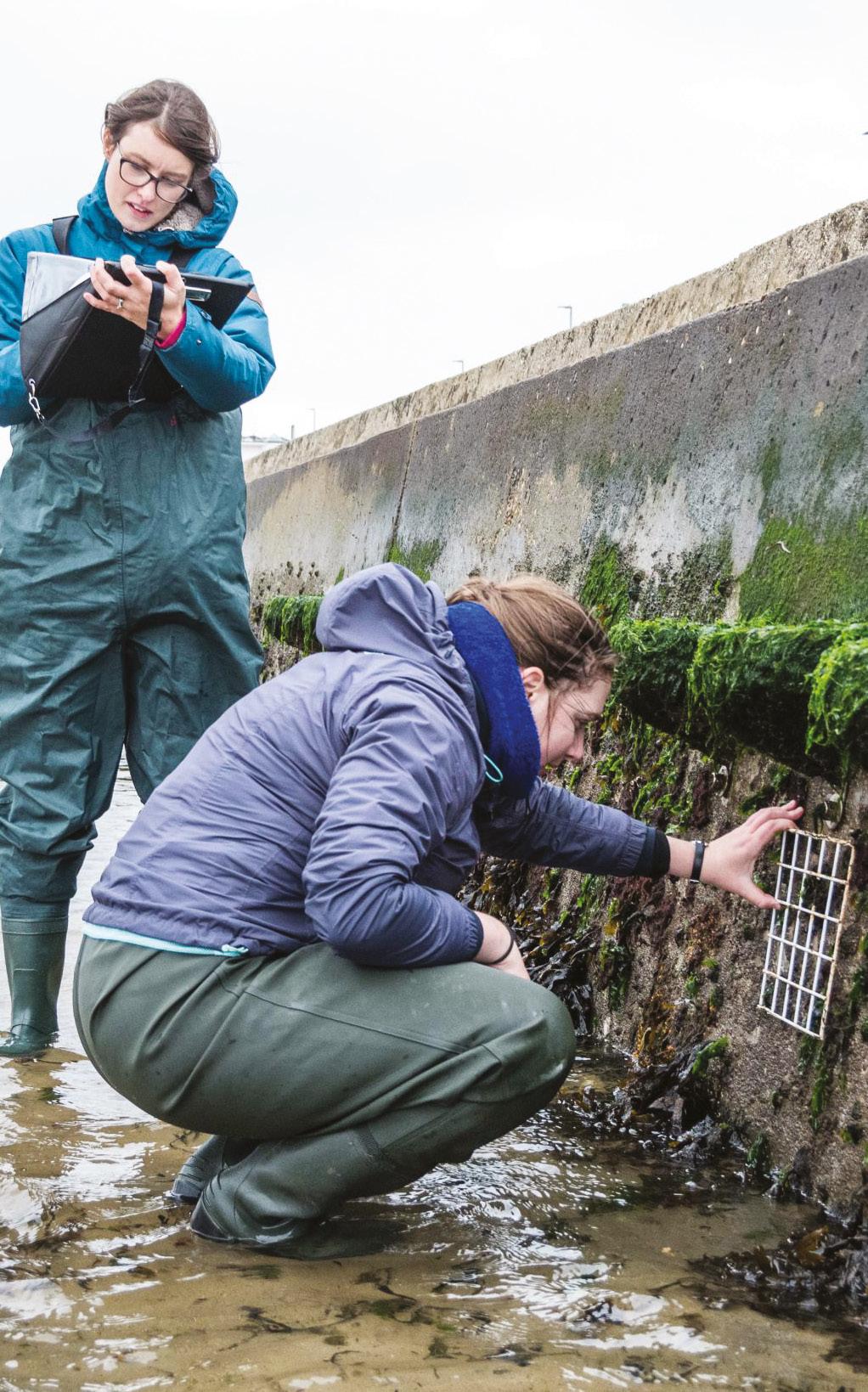
THE Impact Rankings 2023 result
89th in the world
15th in the UK
71.1 Research score out of 100
43% programmes aligned to this UN Sustainable Development Goal
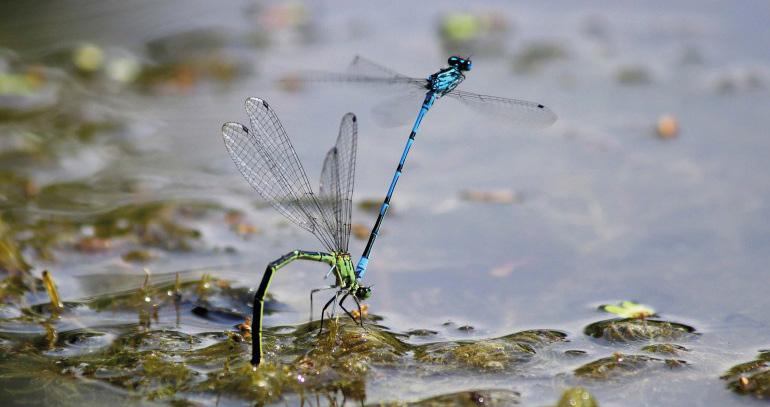
Bigger ponds rich in native plants improve biodiversity in towns and cities
BU academics have uncovered the best ways to manage garden ponds for supporting aquatic species. Recommendations include the need for ponds to be as big as possible to increase species abundance, and the number of native species must be increased to keep a balanced ecosystem. Also, that ponds must be topped up with rainwater to reduce conductivity, which will enable environmentally sensitive species to thrive.
Dr Matthew Hill, Lecturer in Ecology at Bournemouth University and leader of this research said, “There are an estimated two and a half to three and a half million garden ponds in the UK and they can add to local biodiversity if they are managed correctly”.
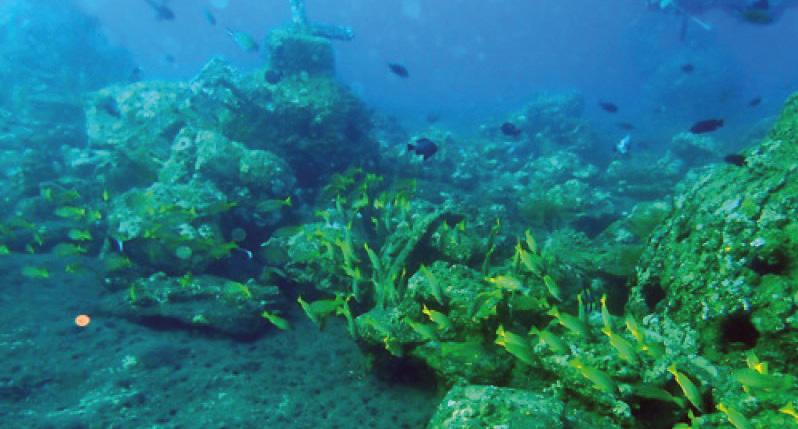
Over a three year period, a research team led by BU oversaw the installation of a series of concrete reefs in Bali, Indonesia. They then took water samples and measured levels of organic carbon. The findings were published in the journal Marine Biology. They revealed that, while artificial reefs do not yet provide the complete set of services that are required to function like coral reefs, they are starting to show similarities, to nearby natural coral reefs.
Zach Boakes, a BU PhD student, said “It is encouraging that our artificial reefs are starting to show similarities, in terms of functioning, to nearby natural coral reefs. The artificial reefs we’re studying are less than 6 years old, so we’re looking forward to continuing this work with our local research partners”.
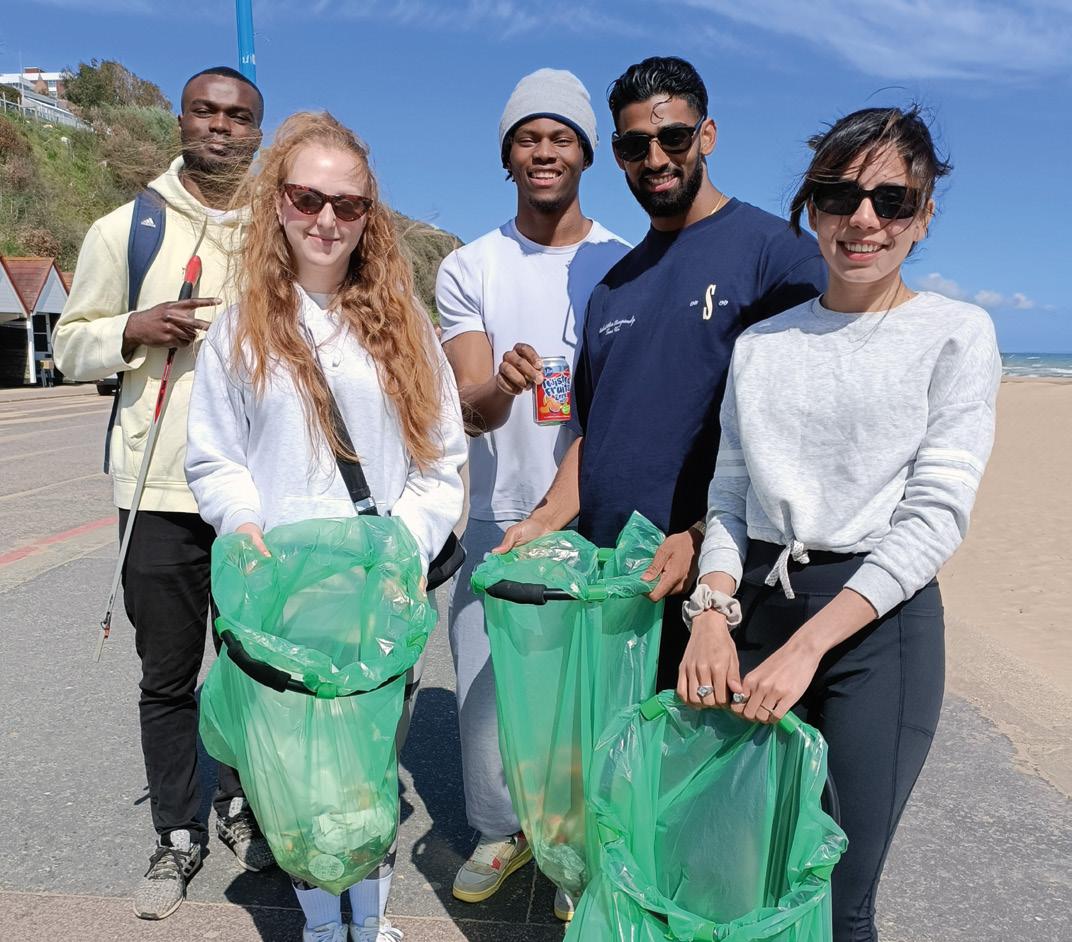
The Community Wardens help students settle into living in the community with the Community Warden Scheme run by SUBU, BU and AUB and supported by Bournemouth Borough Council.
In Spring 2024, the Community Wardens organised a beach litter pick on Bournemouth beach to help students de-stress leading up to exams. 23 students took part, and approximately 40kg of rubbish and micro-plastics were removed from Bournemouth beach.
The Ocean Hackathon is a global competition that brings together students, businesses, academics, and communities to use real-world data to solve marine related problems, with the aim of protecting and preserving our ocean environments.
Teams of experts, BU academics and students with a range of skills worked across a 48 hour period to provide solutions to the challenges presented, including a project to assess the viability of growing seaweed on wind farms as a way of storing carbon, the monitoring of coastal cliffs using AI, and a crowd-sourcing platform for assessing plastics in the ocean. The winning team successfully
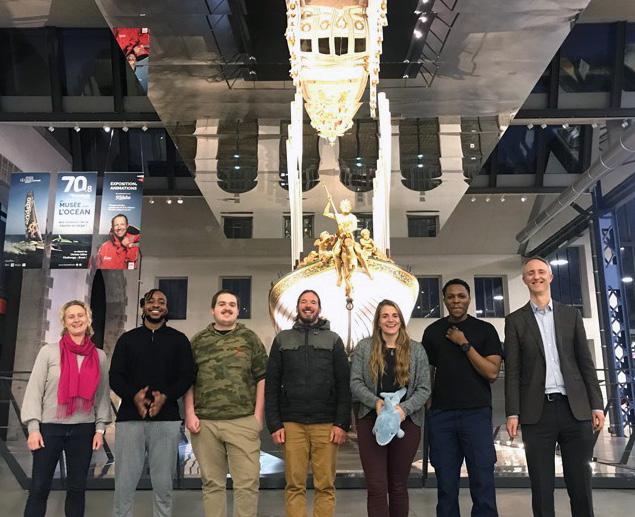
created a proposal for an application to help identify local fish species. The team then joined the winners from 13 other locations in Brest to compete in the Grand Finale to find the overall winner across the global competition.
Leader of the winning team Chris Courage said, “I have taken so much from the experience that I can apply to my own research in technology and working in a team.”
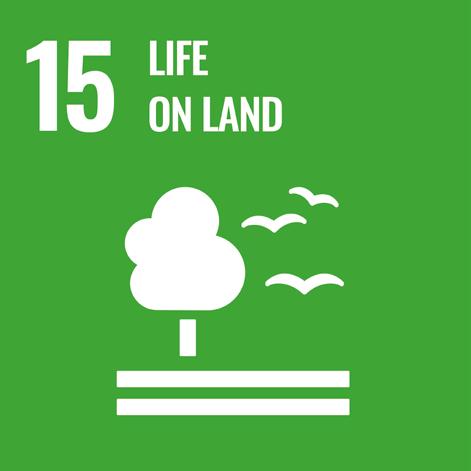
Bournemouth University helps people live better, for longer
Protect, restore and promote sustainable use of terrestrial ecosystems, sustainably manage forests, combat desertification, halt and reverse land degradation, and halt biodiversity loss
Bournemouth University helps to protect and preserve a sustainable environment
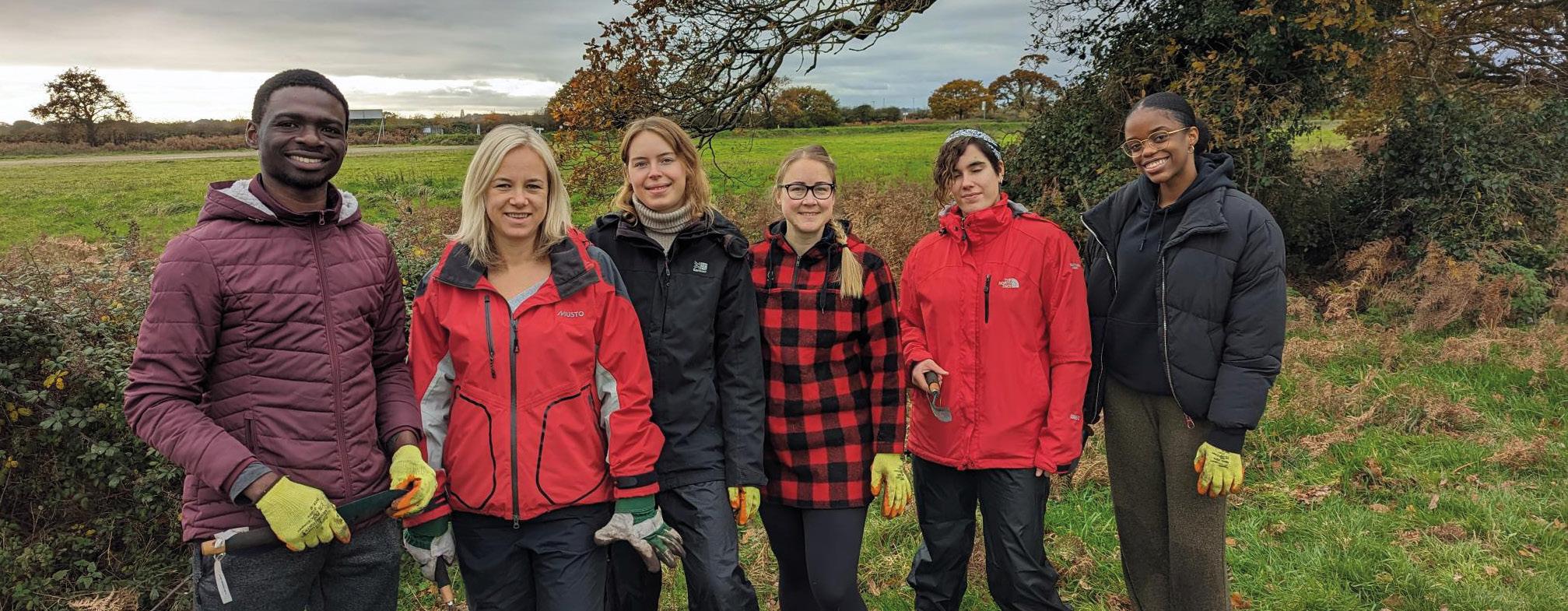
The MSc Biodiversity Conservation course enables students to develop their knowledge of ecology, geography, social science, psychology, technology, and conservation science, to develop their fieldwork skills, and to take part in active conservation research in the local area. Units include Frontiers in Biodiversity, Field Ecology Skills, Biodiversity & Ecosystem Services, International Law of the Environment, and Behavioural Ecology and Conservation, among others.
Upon completing the course, students have both the knowledge and the skills to make a difference to biodiversity conservation, and will be prepared to undertake roles such as ecological consultant, environmental consultant, or environmental conservation manager.
Ecology and environments are core features of courses within our Department of Archaeology & Anthropology. Units include Environmental Archaeology, Geographic Information Systems, Animals & Society, and Emergence & Extinction, which provide students with the skills and knowledge to explore past and current environments in order to manage our future environments effectively and sustainably.
Philosophical and cultural factors are integrated through exploring our biological and social evolution as species, as well as the adaptations of human populations to their respective habitat which always embrace cultural strategies and biological conditions. By considering an ecosystems and holistic approach, the courses provide an insight into the diversity and correspondence of biocultural solutions, which human populations have developed to coordinate these two sides of their life support system.
THE Impact Rankings 2024 result
44th in the world 19th in the UK
85.5 Research score out of 100
54% programmes aligned to this UN Sustainable Development Goal

Dr Elena Cantarello, Principal Academic in Sustainability Science, is part of a European-wide project, RESONATE, which is investigating how forests across the continent are responding to changes in their environment.
This work is focused on the New Forest National Park – a designated site of special scientific interest in the South of England which extends over 140,000 acres. It is an important site for biodiversity; however, the team have observed some concerning changes to the woodlands over recent years.
Dr Cantarello said, “With climate change impacts worsening, we need to expand the area the trees cover wherever possible, but it is also important that we protect the already existing woodlands because trees not only absorb carbon, but they deliver an array of ecosystem services and biodiversity and if we do not protect them we will lose these too”.
BU academics, students and the BU sustainability manager collaborated on research to identify the offsetting potential of nature-based conservation schemes in Dorset, and whether carbon offsetting credits could provide finance for these conservation activities.
The results of this study revealed that many existing schemes in heathlands, woodlands, and grasslands can both enhance biodiversity and capture significant amounts of carbon. On average, the cost of this offsetting is £80 per tonne of CO₂e.
We take part in the #NoMow campaign, led by Plantlife, as this national campaign encourages companies and individuals to leave areas un-mowed during the month of May to support pollinators. Around 50% of our grassy areas have been left untouched by our Estates Team for the whole month.
We have also sown wildflowers across campus to support pollinators and enhance student and staff well-being.
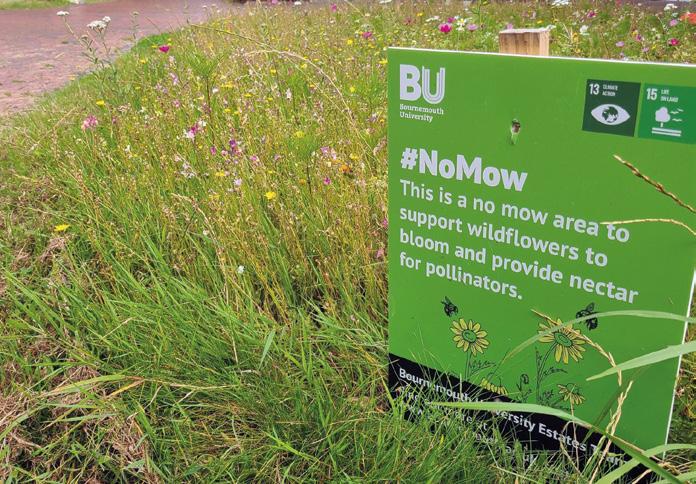
We continue to deliver actions that were identified in summer 2022, by our phase 1 ecological surveys, carried out by a local contractor for our three main campuses. These surveys have enabled us to create a new Biodiversity Action Plan which identifies changes to the way we manage our land to support nature.
This includes leaving more areas to develop as grassland, creating log piles as habitats for insects and adding more native hedgerows. These recommendations were owned by our Biodiversity Group, who are responsible for the Biodiversity Action Plan in line with our CECAP.
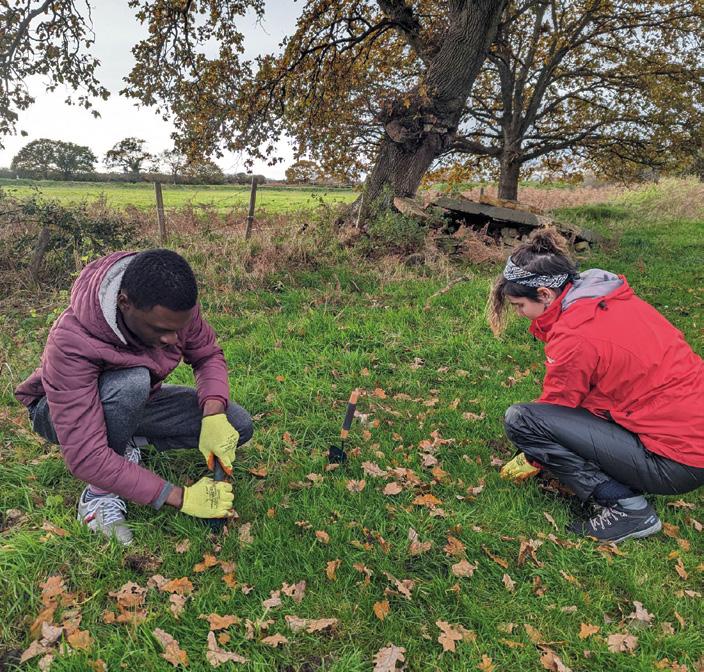
BU were awarded 120 tree saplings to plant at our Sports Campus, Chapel Gate These saplings were kindly donated to BU by the Woodland Trust through the students for Trees campaign, which is run by SOS-UK.
To get these trees planted, the BU Sustainability Team and SUBU officers co-ordinated a volunteering opportunity for BU students. The six different species of tree planted will help to support biodiversity and sequester carbon for years to come, and the students had the opportunity to spend the afternoon connecting with nature, meeting likeminded people, and learning new skills.
In addition, we have planted 6 more mature trees at Talbot Campus specifically chosen to broaden biodiversity, species include small leaved lime, wild service tree, rowan, wild cherry and cherry plumb. These trees were funded by BU estates and this project was delivered by the BU Biodiversity Group.
During the summer of 2023, Lois Betts, Sustainability Manager, worked with Chris Chapleo, Professor of Societal Marketing, to explore the potential for adding nesting features for swifts to existing buildings on campus. Chris is the chairman of the Christchurch Harbour Ornithological Group and arranged for Bob Lord from Hampshire Swifts to come on campus and help identify suitable locations for swift boxes. As a result of this, we commissioned the Southbourne Men’s Hub to build ten swift boxes over the summer of 2023. Estates have installed the boxes ready for the swifts to return in spring.

Lois Betts said: “Thank you to all the organisations who have helped make this project happen and help us progress against CECAP actions ‘NA1.3: Identify opportunities to support nature’ and ‘NA1.4 Encourage staff and students to connect with nature’.”

Promote peaceful and inclusive societies for sustainable development, provide access to justice for all and build effective, accountable and inclusive institutions at all levels
Bournemouth University helps to prepare for and recover from crisis
Bournemouth University challenges marginalisation, misinformation and under-representation
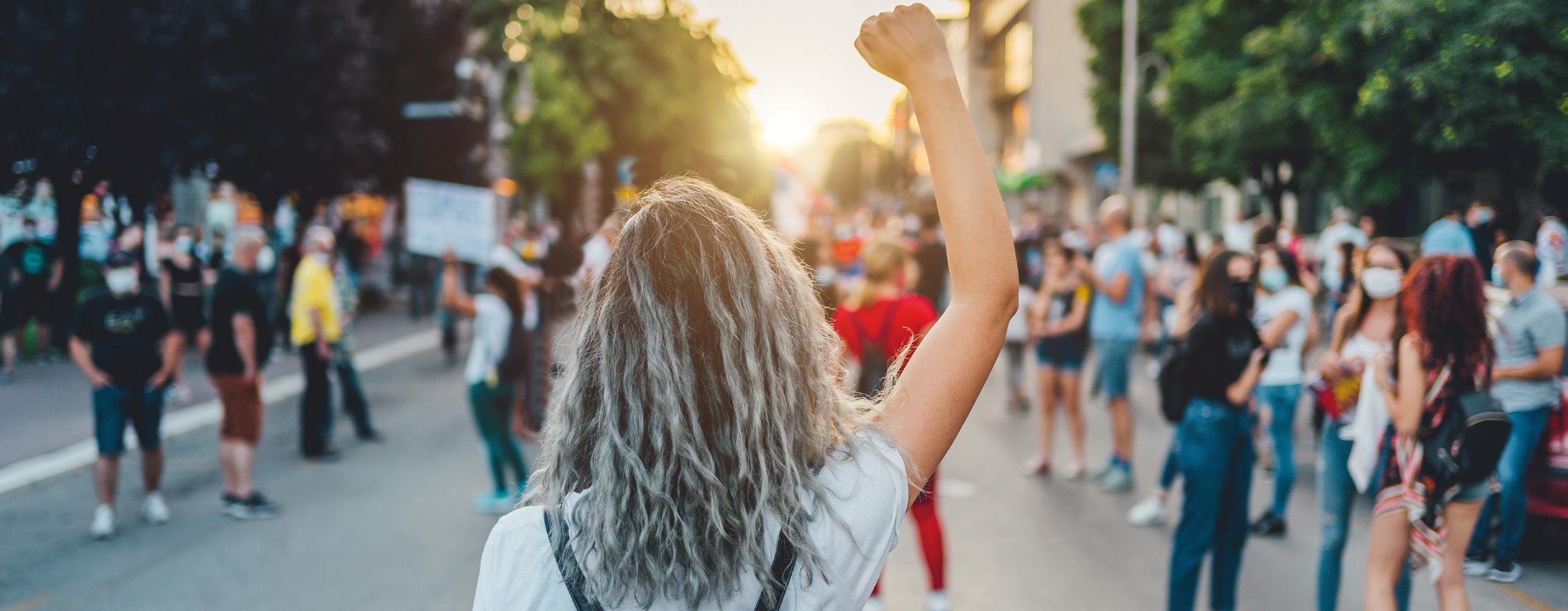
Education
Environmental Law & Social Justice
Environmental policy and law decisions have implications for the environment and the people that rely upon and reside within it.
The Environmental Law & Social Justice course explores the legal and policy dynamics and the factors that influence environmental and social justice outcomes in environmental policy debates. It also identifies how social justice considerations can be incorporated more effectively into environmental policy.
This course enables students to explore global issues they care about themselves, and to evaluate the effectiveness of environmental law and social justice in the context of these issues.
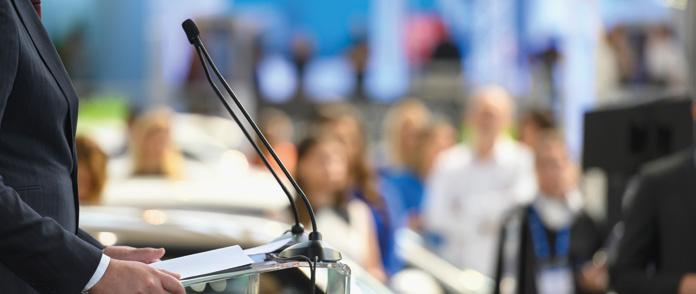
BA (Hons) Politics
BA (Hons) Politics is a dynamic course that enables students to explore the major political challenges of our time with a focus on applying knowledge and skills to real-world situations.
Sustainability is a core theme running through the content, particularly within the Level 5 units Campaigning for Social Change, Environmentalism & the Politics of Sustainability, Global Current Affairs, and Global Governance & International Justice.
101-200 in the world
21st in the UK
73.4 Research score out of 100
71% programmes aligned to this UN Sustainable Development Goal
Documentary and stereotypes
This book Documentary and Stereotypes: Reducing Stigma through Factual Media, written by Dr Catalin Brylla, Principal Academic in Film & Television, studies how documentaries and factual media can contribute to the reduction of social stigma and prejudice. It was aimed at scholars and media makers who seek to increase social inclusion and diversity by deconstructing harmful boundaries between social groups.
The book outlines the functionality of stereotypes as essential processes for social cognition, establishes a classification system for stigmatising media stereotypes, and conceptualises a set of methodologies to reduce stigmatising stereotypes.
Centre for the Study of Conflict, Emotion & Social Justice
Bournemouth University
The Centre for the Study of Conflict, Emotion and Social Justice (CESJ) exists to develop interdisciplinary research at the intersection of conflict, emotion, and social justice, through collaboration between the departments of Humanities & Law, Social Sciences & Social Work, and Communication & Journalism.
Research undertaken within the CESJ aims to address the link between conflict and inequality, explore the psychological, psychoanalytic and social theories that contribute to the modern experience of the world, and to promote diverse and equal societies.
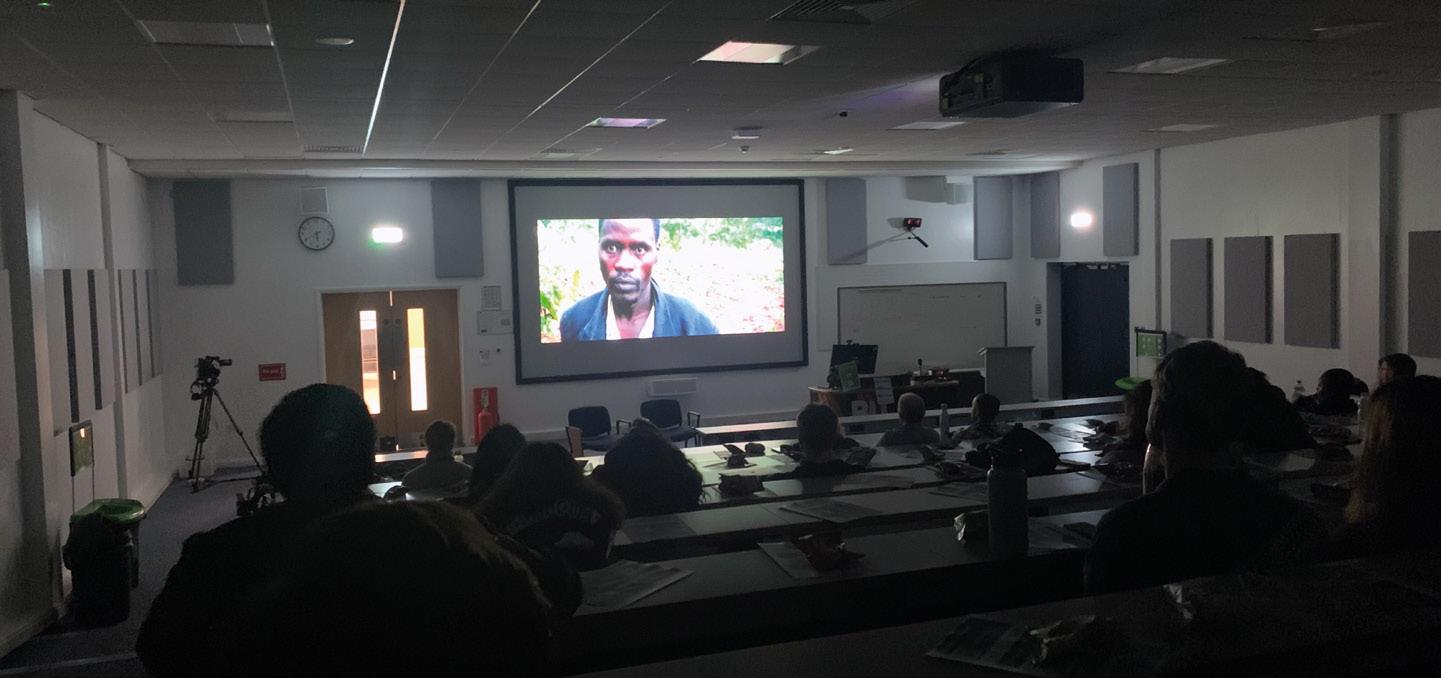
Leading up to the COP28 conference at the end of November, Dr Reina-Marie Loader, Principal Academic in Film Production, organised a screening of Thank You For The Rain, a film that was developed to strengthen the climate justice movement. The screening was open to the entire BU community, and timetabled from the Department of Media Production.
The film follows the story of a Kenyan farmer, Kisilu, the impact of climate change on his family and livelihood, and his journey to becoming a climate activist on a global scale. Following the screening, Dr Reina-Marie Loader organised a conference-style discussion involving the audience, Kisilu himself (who joined virtually) and two local climate activists: Adam Oman (founder of XR Cycling Rebellion) and Tyrone Scott (Senior Movement Building and Activism Officer at War on Want).
We are committed to ethical standards of business conduct and adopt a zero tolerance approach to bribery and corruption in all jurisdictions through our Anti-Bribery Policy and Procedures. Our Code of Practice on Freedom of Speech ensures we can explore academic and challenging topics in a safe environment, while our Ethical Investment Policy reflects our desire to invest in sustainable, responsible ways.
We produce a detailed financial statement annually along with a one-page breakdown of our income and expenditure to ensure transparency and accountability.
The conversation focused on the concept of being a parent to the planet, and the value of grassroot movements in the pathway to climate justice. This event enabled the audience to engage with and understand the disproportionate nature of climate injustice in a very direct manner. When asked “what can we do?”, by a member of the audience, Kisilu answered “become a climate activist!”.
Our University Board oversees the strategic development of the university and ensures the effective use of resources and the general solvency of the institution. It comprises members from within higher education, industry and commerce as well as representatives of students and staff via both academic and professional services staff and the President of the Students’ Union.
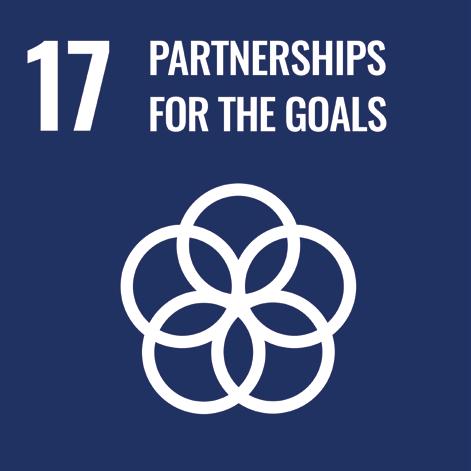
Strengthen the means of implementation and revitalise the global partnership for sustainable development
Bournemouth University challenges marginalisation, misinformation and under-representation
Bournemouth University is helping creative and cultural heritage to thrive
Bournemouth University is acting as a catalyst for growth, using our skills and expertise to boost skills and advance the region
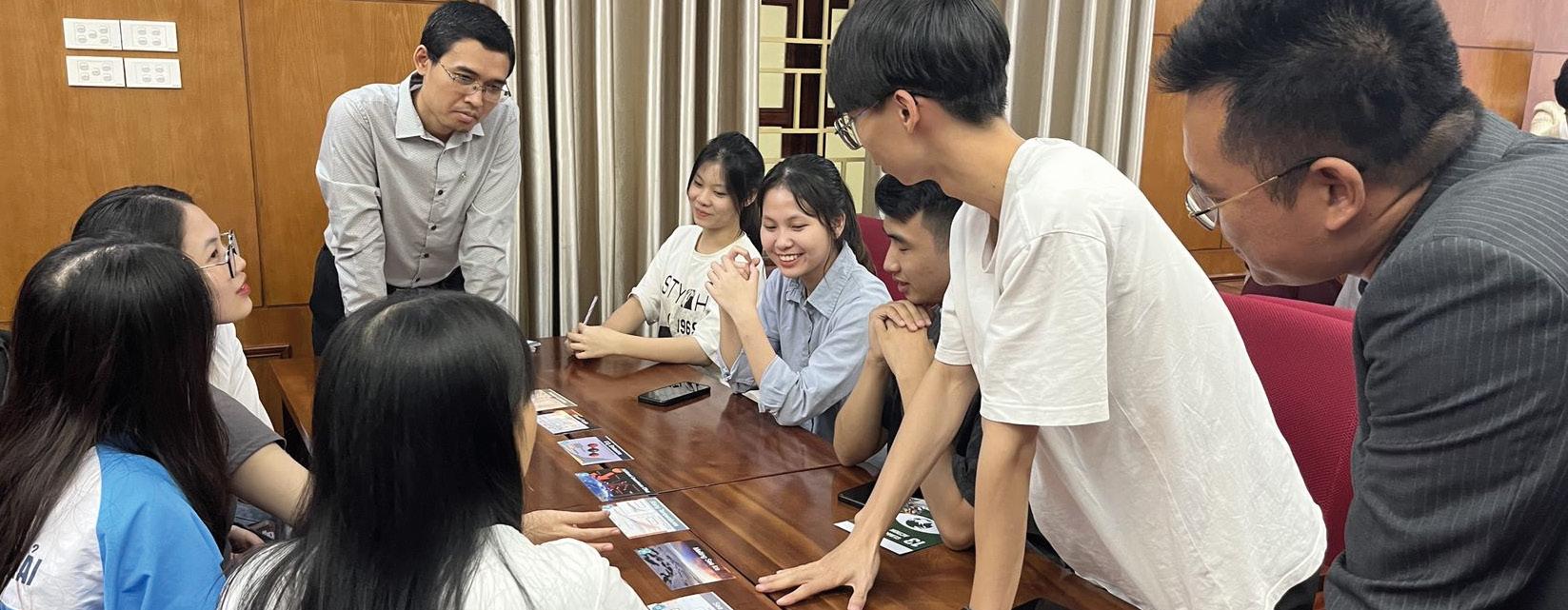
Embedding the SDGs into Vietnamese HE institutions
Dr Milena Bobeva has been working in Vietnam on a project, funded by the British Council Vietnam, to raise awareness amongst students and staff within Vietnamese HE institutions on how the SDGs could be embedded into the curriculum.
The final deliverable of this project will be a multi-media SDG13 Climate Action module in English and Vietnamese to support a cross-university and crosssectorial Community of Practice and build institutional capacity for Education or Sustainable Development.
Dr Bobeva said, “We are now thinking of how to expand the project to include other universities in Vietnam, as well as partners from across the world”
This unit in the Life & Environmental Sciences department explores the interrelationships between controversial and contested terms, sustainable development, and globalisation, and provides students with the knowledge and skills to analyse, interpret and evaluate the current issues and debates related to both concepts.
THE Impact Rankings 2023 result
101–200 in the world
28th in the UK
90 Research score out of 100
61% programmes aligned to this UN Sustainable Development Goal
SPROUT Postgraduate Research (PGR)
Sustainability Collective
Professor Fiona Cownie and PGR student from the Faculty of Science and Technology, Jack Olley, have collaborated with Newcastle University and Cardiff University to develop the SPROUT PGR (Postgraduate researcher) Sustainability Collective.
Their mission is to make a positive contribution to BU’s research culture, and to connect and nurture PGRs, aspiring PGRs and early career researchers (ECRs) who are interested in developing their understanding about how sustainability can enhance the rationale for and impact their research.
Professor John Vinney, BU’s former Vice-Chancellor said: “SPROUT PGR Sustainability Collective is an invaluable opportunity for PGRs to work together towards a sustainable future by bringing together like-minded researchers to connect, inspire and collaborate, to share their knowledge and experience with energy and passion, and to tackle the global challenges we face today”
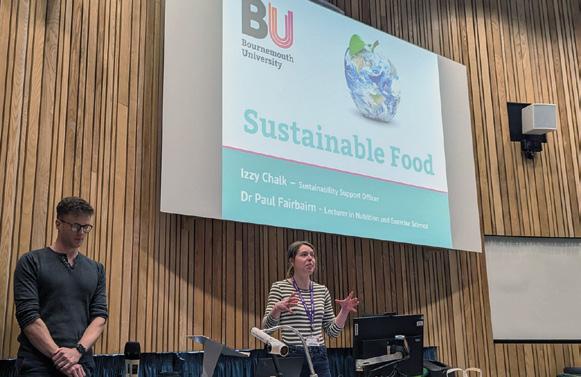
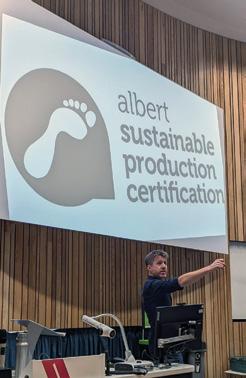
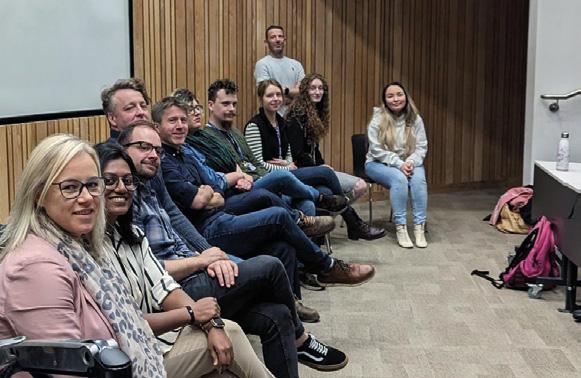
We hosted a Sustainability Day for Year 8 pupils from a local Bournemouth middle school. The purpose of this day was to showcase our best practice in sustainability across the whole of BU, and to inspire young people.
The day began with a tour of our campus led by the sustainability team to show the pupils our on-site lowcarbon technologies, our bus hub, and the biodome. This was followed by four engaging mini lectures on different sustainability topics, including a talk
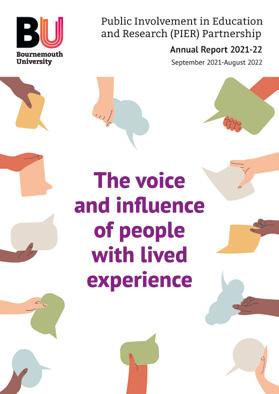
on sustainable fashion, sustainable food, sustainability and computing, and sustainable media production.
The day ended with a panel discussion involving all four faculties, the sustainability team, and the BU student sustainability council, to give the pupils a chance to ask questions. Based on feedback from the school and the pupils who attended, we successfully inspired a large number of young people to both engage with sustainability, and go to university.
The Public Involvement in Education and Research (PIER) partnership is a collaboration between people with lived experience, community partners, academics, and students. The goal of PIER is to improve the lives of those most affected by health and social inequalities. Between 2022-23, PIER facilitated collaborations with 40 different organisations, trusts, local authorities and charities. Read the PIER Annual Report 2022-23.
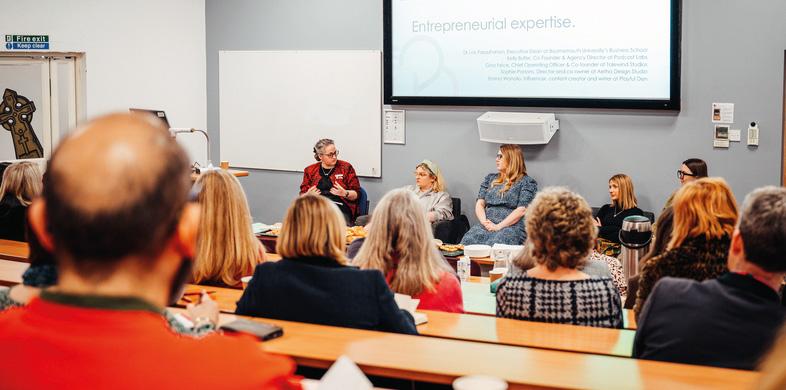
At BU, we collaborate with partners around the world to deliver impact on global challenges through our education, research and practice. BU is currently involved with over 100 partnerships in the UK and around the world, and our Global Engagement Hub works closely with them to advance knowledge, build our global
outlook, develop our impact and grow worldwide recognition of BU.
In 2018, we signed the SDG Accord to recognise the role education has in, and commit to supporting, the delivery the UN SDGs, and is committed to the Principles for Responsible Management Education (PRME).
Our civic partnerships include working with BCP Council on planning and the environment, our agreement with University Hospitals Dorset promoting research collaboration and placement support, and our Chief Operating Officer Jim Andrews sitting on the board of the Dorset Local Enterprise Partnership as a higher education representative.
Our Business School joins less than 5% of business schools globally to attain the Association to Advance Collegiate Schools of Business (AACSB) accreditation and is a full member of The European Foundation for Management Development.
BU work in partnership for climate action with both BCP and Dorset Councils and other regional stakeholders from the public and private sectors. The focus of this year. has included on sustainable procurement tools with Dorset Council and on the Local Area Energy Plan with BCP Council.